2002




From left: "Oasis", "Chihwaseon", "The Way Home", "Sympathy for Mr. Vengeance"
The year 2002 could probably be described as "the best of times, and the worst of times." One one level, Korean cinema continued its breathtaking run of popularity with local audiences, winning over a 45.2% market share in Seoul, only slightly lower than the 46.1% recorded in 2001 (market share in Korea as a whole was likely higher, but harder to measure). Whereas 2001 featured five smash hits that towered about the competition, box-office in 2002 was more spread out, with a string of mid-level hits to complement the top earners Marrying the Mafia, The Way Home, and Sex is Zero. There were many box-office surprises as well, from the smashing success of the low-budget rural film The Way Home to the better than expected performance of films by top auteurs such as Oasis (Lee Chang-dong) and Chihwaseon (Im Kwon-taek).
On the other hand, 2002 was the year when many investors lost confidence in the industry, following the spectacular failures of big-budget genre films Yesterday, R U Ready? and Resurrection of the Little Match Girl. With budgets soaring higher and higher, even many films that did well at the box-office ended up losing considerable sums of money. As a result, many of the venture capital companies who had rushed into the industry in 2000 and 2001 decided to move out, leaving many production companies short of cash. Although long-term, the bursting of the investment bubble was probably a good thing, in the short term it caused considerable turmoil in the industry and led to the cancellation of many projects.
Artistically, however, Korean cinema was in top form. Several Korean films won prestigious awards at overseas festivals, including Chihwaseon (Best Director, Cannes), Oasis (Best Director and Best New Actor/Actress, Venice), and My Beautiful Girl, Mari (Grand Prix, Annecy International Animated Film Festival). Other films were less recognized, but no less accomplished, such as Park Chan-wook's Sympathy for Mr. Vengeance and Hong Sangsoo's Turning Gate.
Reviewed below: My Beautiful Girl, Mari (Jan 11) -- A.F.R.I.K.A. (Jan 11) -- Bad Guy (Jan 11) -- Public Enemy (Jan 25) -- Looking For Bruce Lee (Jan 26) -- 2009 Lost Memories (Feb 1) -- Saulabi (Feb 22) -- No Blood No Tears (Mar 1) -- My Beautiful Days (Mar 16) -- Turning Gate (Mar 22) -- Sympathy for Mr. Vengeance (Mar 29) -- The Way Home (Apr 5) -- Marriage is a Crazy Thing (Apr 26) -- Chihwaseon (May 10) -- Over the Rainbow (May 17) -- No Comment (May 31) -- Bet On My Disco (Jun 6) -- Yesterday (Jun 13) -- Champion (Jun 28) -- Phone (Jul 26) -- A Perfect Match (Aug 8) -- Oasis (Aug 15) -- Three (Aug 23) -- Resurrection of the Little Match Girl (Sep 13) -- Camel(s) (Sep 27) -- Saving My Hubby (Oct 18) -- Road Movie (Oct 18) -- Popee (Oct 18) -- Wet Dreams (Nov 6) -- Ardor (Nov 8) -- Jail Breakers (Nov 21) -- The Coast Guard (Nov 22) -- Public Toilet (Nov 29) -- Too Young To Die (Dec 6) -- A Bizarre Love Triangle (Dec 6) -- Sex is Zero (Dec 12) -- H (Dec 27) -- Conduct Zero (Dec 27).
| Korean Films | Nationwide | Seoul | Release Date | Weeks | |
|---|---|---|---|---|---|
| 1 | Marrying the Mafia | 5,021,001 | 1,604,219 | Sep 13 | 10 |
| 2 | The Way Home | 4,091,000 | 1,596,521 | Apr 5 | 11 |
| 3 | Sex is Zero | 4,089,900 | 1,313,570 | Dec 13* | 9 |
| 4 | Jail Breakers | 3,073,919 | 922,467 | Nov 21* | 7 |
| 5 | Public Enemy | 2,987,900 | 1,161,500 | Jan 25 | 8 |
| 6 | Wet Dreams | 2,432,950 | 760,698 | Nov 6 | 7 |
| 7 | 2009 Lost Memories | 2,263,800 | 882,400 | Feb 1 | 6 |
| 8 | Phone | 2,182,915 | 765,000 | Jul 26 | 6 |
| 9 | Champion | 1,770,000 | 567,000 | Jun 28 | 5 |
| 10 | Conduct Zero | 1,683,533 | 701,624 | Dec 27* | 6 |
| All Films | Nationwide | Seoul | Release Date | Weeks | |
|---|---|---|---|---|---|
| 1 | LOTR: The Two Towers (NZ/US) | 5,145,193 | 1,771,966 | Dec 19* | 8 |
| 2 | Marrying the Mafia (Kor) | 5,021,001 | 1,604,219 | Sep 13 | 10 |
| 3 | ...Chamber of Secrets (UK/US) | 4,340,487 | 1,522,988 | Dec 13* | 7 |
| 4 | The Way Home (Kor) | 4,091,000 | 1,596,521 | Apr 5 | 11 |
| 5 | Sex is Zero (Kor) | 4,089,900 | 1,313,570 | Dec 13* | 9 |
| 6 | LOTR: Fellowship... (NZ/US) | 3,873,300 | 1,361,855 | Jan 1 | 11 |
| 7 | Minority Report (US) | 3,379,000 | 1,400,200 | Jul 26 | 10 |
| 8 | Jail Breakers (Kor) | 3,073,919 | 922,467 | Nov 21* | 7 |
| 9 | Public Enemy (Kor) | 2,987,900 | 1,161,500 | Jan 25 | 8 |
| 10 | Spider-Man (US) | 2,901,821 | 1,107,600 | May 4 | 8 |
* Includes tickets sold in 2003. Source: Korean Film Council (KOFIC).
Seoul population: 10.32 million
Nationwide population: 47.9 million
Market share: Korean 48.3%, Imports 51.7% (nationwide)
Films released: Korean 78, Imported 266
Total attendance: 105.1m admissions
Number of screens: 977 (nationwide)
Exchange rate (2002): 1214 won/US dollar
Average ticket price: 6,035 won (=US$4.97)
Exports to other countries: US$14,952,089 (Japan: 44%)
Average budget: 2.45bn won + 1.27bn p&a costs
Short Reviews
These are some reviews of the features released in 2002 that have generated the most discussion and interest among film critics and/or the general public. They are listed in the order of their release.
It's been a long time since Korean animation has occupied a major position within the industry. In the 1970s, local animated films (mostly broadcast on TV) attracted viewers with creative images and stories, but in the decades since, Korea has produced little animation outside of outsourcing work for foreign studios (much of The Simpsons was drawn in Korea, for example).
 In recent years, several new production companies have made an effort to revive the industry and utilize local drawing talent for homegrown films. Although several high-profile works are on the way, My Beautiful Girl, Mari is the first major animated film in years to try to forge a new image for the industry.
In recent years, several new production companies have made an effort to revive the industry and utilize local drawing talent for homegrown films. Although several high-profile works are on the way, My Beautiful Girl, Mari is the first major animated film in years to try to forge a new image for the industry.
Mari tells the story of a boy named Namoo who lives in a seaside village. Several years after the death of his father, Namoo finds himself faced with further struggles: his grandmother is ill, his mother has a new boyfriend, and his best friend will move to Seoul at the end of the summer. Struggling with the prospect of further loss, Namoo begins to lose himself in fantasy, dreaming of a mysterious girl named Mari who leads him to another world.
This film's director, Lee Sung-gang, is a rising talent who had drawn notice previously for his animated shorts, which played at many overseas festivals. The images he creates for My Beautiful Girl, Mari were made on the computer with fairly simple tools, such as Flash and Illustrator. Nonetheless the end result is dazzling: a multi-textured, vibrant world that is poetic in its simplicity. The voices for the film were recorded by real children (a refreshing change from the practice of having adults speak in high pitch), as well as some famous actors: both Lee Byung-heon and Ahn Sung-ki contribute their talents.
Although this film was not a success at the box-office, it represents both a major step forward for Korean animation and the birth of a wondrous film that deserves not to be overlooked. Apart from its remarkable imagery, the film also proves to be a touching portrait of how children deal with loss. With luck, someday we may look back upon this film as a first step in the rebirth of Korean animation. (Darcy Paquet)
Once a successful comedy director, Shin Seung-soo's latest works haven't attracted audiences, often silently lurking at the bottom of the year's box office. His latest 'girls with guns' effort seems no different. It offers nothing we haven't seen before, and no bankable stars - at least not yet, both Lee Yo-won and Kim Min-sun could become stars in the future. But despite its derivative plot, A.F.R.I.K.A. is reasonably well made and a decent ride, if your expectations are set at the right level.
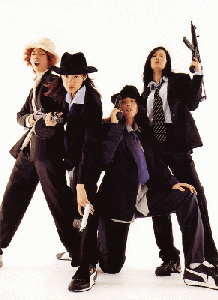
The cocktail of attractive young girls, loud rock music, a few action scenes, and the usual amount of silly comedy has made many films a success, but it's probably what makes A.F.R.I.K.A. a rather forgettable affair. It tries so hard to be cool, slick and funny that it forgets to take care of the fundamentals, like a script that flows well, or engaging characters. The film follows the adventures of four girls, who meet by accident and become a runaway team of idols (the film's title means "Adoring Four Revolutionary Idols Korean Association", named after the girls' Internet Fan Club). Through robbing gas stations, stealing cars, dealing with the people following them -- a cop and a gangster, driving together! -- the four become popular. One of the film's good ideas is showcasing, with the use of pop culture references, how the girls achieve their fame. Thanks to TV and the Internet they become so famous that fake A.F.R.I.K.A. teams start to pop up.
The characters are little more than stereotypes. Rising star Lee Yo-won is the classic charismatic leader with an edge; Kim Min-sun the sexy, shallow 'babe' who raises a fuss over clothes and hair. Cho Eun-ji is the annoying, ugly duckling who we're supposed to care about, and Lee Young-jin the tough girl who often acts superior. The film does a good enough job of making this obvious, so that we take nothing seriously. But, that's a double edged sword, because at the end you don't really care about the characters. Better is the supporting cast who really carries the film. Lee Je-rak, Park Young-kyu and company frequently steal the show from the four girls, creating a few memorable moments. There are even references to recent popular comedies like Kick The Moon, Attack The Gas Station, and My Wife is a Gangster.
With all its flaws, A.F.R.I.K.A. still manages to be fun, in a rather mindless way. Not all the jokes work, sometimes the girls overact a little too much, but the overall tone of the film makes you forget about such things pretty quickly. If you're looking for a night of low-maintenance fun, without strings attached, you'll probably enjoy the antics showcased in A.F.R.I.K.A. (V. "x" Naldi)
A pimp is walking through downtown Seoul one day when he sees a middle-class college student sitting on a park bench. Smitten by her beauty, he goes and sits next to her, but she glares at him in disgust and walks away. Following behind, he kisses her violently out of the blue, but a group of passing soldiers subdue him. The girl spits in his face. Offended, yet still drawn to her, he starts to devise a sinister plan: to bring her down to his level, and make her a prostitute.
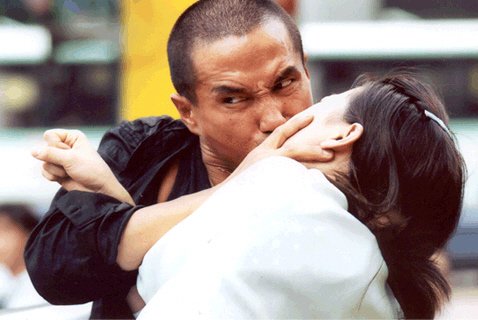 Bad boy director Kim Ki-duk has been eagerly sought after by international film festivals ever since his third movie Birdcage Inn (1998). His films can be relied on to provide striking visuals and plenty of controversy. His work has become quite popular with audiences in Europe. Up until recently, however, he remained more or less unknown to Korean moviegoers, with none of his films registering more than a blip at the local box-office.
Bad boy director Kim Ki-duk has been eagerly sought after by international film festivals ever since his third movie Birdcage Inn (1998). His films can be relied on to provide striking visuals and plenty of controversy. His work has become quite popular with audiences in Europe. Up until recently, however, he remained more or less unknown to Korean moviegoers, with none of his films registering more than a blip at the local box-office.
This changed with Bad Guy. Several factors may have contributed to local audiences' strong interest in the film. To begin with, it was released just as lead actor Jo Je-hyun was winning over fans in the hit TV drama Piano. Kim had also slowly gained a reputation as "that director who's popular abroad", and audiences' curiosity, together with a marketing campaign centered around the film's provocative themes, turned Bad Guy into a commercial success.
Few viewers are likely to leave the theater without strong feelings for or against this film. It features striking images and music, disturbing violence, strong acting, logic-defying plot developments, and a provocative epilogue that seems intended to stir up controversy. The film makes perhaps the most sense if you read it as a collision between the lower and middle classes. Kim himself is the product of a difficult upbringing that has left him feeling outraged at the inequities in Korean society.
From a psychological perspective, the plot seems a major stretch, at least from the female character's point of view. Kim says he wanted to show the "inevitability" of the film's final outcome, but the change that our female lead undergoes seems calculated, and more the product of male fantasy than a response to all she has experienced. No matter, some viewers will argue -- but I still feel this film could have been stronger if it could have got more convincingly into the head of our inexperienced young prostitute. (Darcy Paquet)
Many things have changed in the Korean film industry since Kang Woo-suk's last film, the '98 court comedy Bedroom and Courtroom. The man himself has become the most important figure in Korean Cinema. His production company, Cinema Service, is the top distributor in the country. After a three year-long hiatus, director Kang has come back with Public Enemy, marketed strongly around the Two Cops director's new 'hardboiled' streak. And indeed he has changed. Like his successful comedies (Two Cops, How To Top My Wife), Public Enemy uses social satire as one of its main selling points. But, in contrast with his previous works, it's grittier and much bloodier.
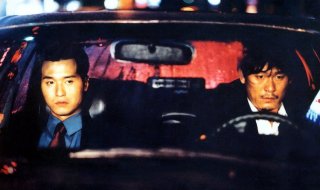 Detective Kang Chul-joong (Sol Kyung-gu) is the complete antihero, stealing drugs from dealers, taking bribes left and right, neglecting his duties as a father, and dealing with suspects without the chore of following procedure. Cho Gyu-hwan (Lee Sung-jae) is the perfect case of split personality. When we first meet him, he's masturbating under the shower throwing profanities at his imaginary companion. Suddenly, out of the shower he's a normal family man, caring and considerate.
Detective Kang Chul-joong (Sol Kyung-gu) is the complete antihero, stealing drugs from dealers, taking bribes left and right, neglecting his duties as a father, and dealing with suspects without the chore of following procedure. Cho Gyu-hwan (Lee Sung-jae) is the perfect case of split personality. When we first meet him, he's masturbating under the shower throwing profanities at his imaginary companion. Suddenly, out of the shower he's a normal family man, caring and considerate.
The two get to know each other in the strangest of ways: while detective Kang is forced to defecate near an electric pole in the pouring rain, Gyu-hwan walks behind him, black raincoat and menacing grin, just minutes after having completed his first senseless murder. He stabs him too, and will force Detective Kang to change his habitual ways to catch him. And maybe change his life in the process.
In Public Enemy there are no conventionally sympathetic characters: everybody is bad, and the film gains immensely from this. While Sol Kyung-gu and Lee Sung-jae battle each other through the course of the film, the usual array of memorable supporting characters tones down the harshness of the film. From Lee Moon-shik (who played the 'marine monk' in Hi, Dharma) as Mr. Math, to stage actor Kang Shil-in as the captain of the Homicide department. From Sung Ji-roo (a staple of Korean comedies) as the green-haired drug dealer, to Yoo Hae-jin as the retired Jopok who now acts as Chul-joong's 'knife expert.' The comedy in Public Enemy is tremendously effective. And, personally, it doesn't feel forced like in many of Kang's previous films.
This mix of bloody action and comedy will not appeal to everybody. Both the murders and the jokes are pretty graphic in their depiction, and the lack of sympathetic characters might leave people used to director Kang's directorial style a bit puzzled. Still, Public Enemy is excellently produced, with a fantastic performance from Sol Kyung-gu (who gained 20 Kg for the role, and subsequently lost them again for Oasis. That's dedication), and really good chemistry between the two main characters. Also, unlike many of Kang's films, it doesn't overstay its welcome, even for a 138 minute film. Kang Woo-suk has made a darker, funnier and smarter film, one of the year's biggest surprises. (V. "x" Naldi)
Take part DIY, part Rebel Yell, part stream of consciousness, part documentary, and mostly part promotional material for the band Crying Nut, and what do you get? Well, pretty much a complete mess. Looking For Bruce Lee stars the four young men of said band and the city they call home, Seoul. However, while most young people must sit passively and watch the city they know and love fail to be represented on the screen as they know it and love it, resolved to voice their protest by throwing popcorn, (or this being South Korea, dried squid), at the screen, director Kang Lone and the boys of Crying Nut have decided to Help themselves in this Quadrophonic teenage wasteland of Hey, Hey We're The Punkees.
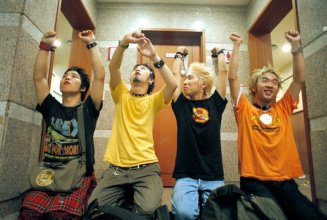 What there is of a plot revolves around a serial killer who leaves Bruce Lee imagery placed all artsy-like beside the victims' bodies. The band's bassist, Han Kyung-rok, takes it upon himself to solve these murders. On his way, the film takes on a disjointed narrative with philosophical ramblings, fun with special effects, and intermittent interviews with Pilipina/o, Pakistani, Chinese, and other immigrants, plus Koreans who speak German and French and one who is quite attached to India.
What there is of a plot revolves around a serial killer who leaves Bruce Lee imagery placed all artsy-like beside the victims' bodies. The band's bassist, Han Kyung-rok, takes it upon himself to solve these murders. On his way, the film takes on a disjointed narrative with philosophical ramblings, fun with special effects, and intermittent interviews with Pilipina/o, Pakistani, Chinese, and other immigrants, plus Koreans who speak German and French and one who is quite attached to India.
These interviews allow for something to salvage from this wreckage. One of the immigrants interviewed, whom I'm guessing is Eritrean or Ethiopian, represents one of the core themes with this comment made in English: "Everybody's asking me if I'm American. So from this thing, I can feel that American culture is dominating Korea." The title of this film alludes to this possible domination. "Looking For Bruce Lee" can be interpreted to mean looking for American culture, since, Bruce Lee was American. However, most Americans have to be reminded Bruce Lee was American, since he made his name in Hong Kong films. And Bruce Lee resisted calls to assimilate to the American culture he heard around him. Perhaps, this resistance to American pop culture is why Han's looking for Bruce Lee, to find his own way of appropriating cultural artforms that came to his home from elsewhere. Such resistance resonates in Looking For Bruce Lee in the piercing scream of the young Korean woman who finds her fun interrupted by an American who imposes himself on her. Kyung-rok, upon hearing the scream, jumps in to address the situation. His bruises in the next scene tell us a fight occurred, hinting at his resistance to being defined fully by another culture.
For all its disjointedness, Looking For Bruce Lee does challenge the view that all pop cultural expressions are examples of mimic-ing American culture. These kids aren't just appropriating straight from American culture, as the interviews with all the immigrants mentioned before demonstrate. We're following a Punk band here. Punk music itself represents a multiplicity of cultural influences. Punk came out of Rock music, a genre developed in America with heavy initial influence from other genres such as Blues which were nourished by African-American communities. Although Punk's origins are often credited to the American band The New York Dolls, so much of its variations were formed in England via Punk stalwarts such as The Sex Pistols. And just as recent American Rock bands have borrowed from Hip-Hop, British Punk appropriated heavily from Ska, as Crying Nut demonstrates in the track that opens the film. Ska is a musical genre that came to England from Jamaica. And the first Jamaican Ska band to tour England was led by a Chinese-Jamaican, Byron Lee and the Dragonaires. So it's not as simple as saying American culture is taking over South Korea. It's more than just America that's influencing Korean youths. And Korean youths are not just buying what America is selling. Like all involved in the Korean movie industry, they are bringing their own flavor to the smorgasboard of genres. Culture, like its brethren Language, morphs with the local and the global simultaneously. Crying Nut just wants to tell their story through the multiple media available to them. And, regardless of how incoherent it is at times, their story is one of the multiple stories of an ever mutating Seoul.
It is the inclusion of the snippets of stories of so many different immigrants in South Korea that most impresses me about the film. Although we've seen immigrant characters portrayed in such films as Failan and Take Care of My Cat, we've never seen so many presented in any Korean film before nor have they been allowed to speak for themselves. Although some of the interviews appear to be staged soliloquies, others appear to be very sincere. Many Punk lyrics revolve around feeling like an outsider and here we have a Punk journey that joins in solidarity with the ultimate outsiders, immigrants. "You can't understand me," says a Pilipina immigrant ending her interview. And you sense that, even if these kids don't know what she's saying, they definitely understand what it's like not to be understood.
Regardless of this melody hidden within the distortion, for those who have no affection for Punk music or ADD-like, art-school, filmic meanderings, this film will be a wrenching pain to watch. It veers off in so many directions with what appears to be editing as an afterthought, or as no thought at all, that it's difficult to discern a coherent whole. (What's that whole woman cutting off her leg story about? A metaphor for "selling out"? Sadly, whatever it is, it turns into yet another stereotypical portrayal of the Disabled, what Martin F. Norden would describe as the "Obsessive Avenger" trope.) Perhaps Kang could get away with this disarray by claiming an anarchic punk expression, but that would be too easy an out. The movie wants to present a theme. It's "Looking For Bruce Lee," isn't it? And exploring subthemes haphazardly with very weak editing choices, such as intertitles placed at random, mostly defeats the film's mission. One band member, perhaps intentionally, sums up the film when he narrates how his pre-Punk forays into writing "lacked structure, syntax . . ." and how his "metaphors weren't harmonious." Right there, the film provides its own review. (Adam Hartzell)
2009 Lost Memories unfolds from an intriguing premise: what if An Jung-geun had failed to assassinate Ito Hirobumi in Harbin, 1909, and this single incident opened an alternative historical path -- in which Japan had never lost the Second World War, Korea had never gained independence, and still remains Japan's colony as of 2009? Based on a novel by Bok Geo-il (who sued the production companies to have his name removed from credits), the film proved a hit with moviegoers, although its expensive production cost (estimated at more than 6 million dollars) made it less profitable than more cheaply made The Way Home and Marrying the Mafia.
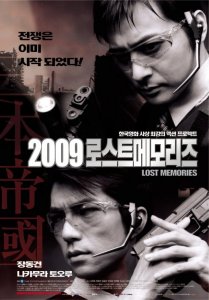 The idea behind the project gets high marks for innovation and daring. It is extremely rare for Korean cinema to tackle subjects even half-heartedly science fictional, much less such hot-potato topics as the impact of Japanese colonization on Korean history. Sure, I can find numerous faults with the movie's narrative logic, historical authenticity and production details ("Furei senjin," a real historical term, is never spelled correctly; All Japanese women in this movie look and behave in the way middle-aged Korean men would like to think of them, i.e. kimono-clad, utterly subservient housewives, already stock figures in early twentieth century Japan; Jang Dong-gun's Saigo shoots his erstwhile colleague dead, seemingly having figured out the latter's betrayal through telepathy; to name only a few problems), but all these can be called minor caveats. Neither do I feel like taking the movie to task for toeing the hoary Koreans-not-Japanese- should-conquer-the-world- nationalist line. (Is it just me who thinks that the movie's vision of the utopian "unified Korea" looks suspiciously like North Korea's "paradise on earth"?) After all, one can argue that Bruce Lee's Fist of Fury also presents gross, Sinocentric stereotypes of Japanese. Finally, I am willing to ignore the film's failure to satisfactorily resolve the time-travel paradox in its frankly ludicrous ending.
The idea behind the project gets high marks for innovation and daring. It is extremely rare for Korean cinema to tackle subjects even half-heartedly science fictional, much less such hot-potato topics as the impact of Japanese colonization on Korean history. Sure, I can find numerous faults with the movie's narrative logic, historical authenticity and production details ("Furei senjin," a real historical term, is never spelled correctly; All Japanese women in this movie look and behave in the way middle-aged Korean men would like to think of them, i.e. kimono-clad, utterly subservient housewives, already stock figures in early twentieth century Japan; Jang Dong-gun's Saigo shoots his erstwhile colleague dead, seemingly having figured out the latter's betrayal through telepathy; to name only a few problems), but all these can be called minor caveats. Neither do I feel like taking the movie to task for toeing the hoary Koreans-not-Japanese- should-conquer-the-world- nationalist line. (Is it just me who thinks that the movie's vision of the utopian "unified Korea" looks suspiciously like North Korea's "paradise on earth"?) After all, one can argue that Bruce Lee's Fist of Fury also presents gross, Sinocentric stereotypes of Japanese. Finally, I am willing to ignore the film's failure to satisfactorily resolve the time-travel paradox in its frankly ludicrous ending.
All these problems could have been forgiven, if only the movie itself was entertaining. Before seeing it, I expected Lost Memories to be one of those overproduced quasi-Hollywood blockbusters: the kind of movie you are slightly ashamed of admitting that you enjoyed it -- crass, maybe, but fun.
What I ended up with was anything but: a lugubrious, turgid "epic," wallowing in its own sense of teeth-rattling pseudo-profundity. Its idea of "action" is having people running back and forth in flat, boring setups, firing tons of bullets from submachine guns at each other, and showing in gory details their bodies being punched full of bloody holes. Jang Dong-gun, obviously speaking his Japanese dialogue phonetically, and Nakamura Toru, as two male leads, acquit themselves through sheer star charisma, even though their characters are not much more than Action Movie Types: you know these men have never sneezed or cracked a joke once in their lives. Director Lee Si-myong, obviously a sincere fan of John Woo, rigorously copies the Hong Kong-born auteurs's worst traits -- his aggressively macho sentimentality and lack of restraint, to cite two examples -- without having learned a shred of the latter's wit or visual poetry. In one sequence, a little boy is brutally killed by gunfire, and his mid-air "balletic" death throes are cross-cut with shots of another child running into her father's embrace, all shown in agonizing slow motion. Scenes like this remind me, instead of the romanticized violence in a John Woo film, of an old propaganda TV drama in which North Korean Communist guerrillas mow down Commie-hating South Korean children in, what else, excruciating slow motion. (Can a Korean director ever make an action movie without using slow motion cinematography? Every second or third gong-dang scene in Lost Memories winds down to a crawl, in some cases totally trivializing whatever it is that the scene tries to convey, in other cases compromising perfectly fine effects shots or performances. I wouldn't have been surprised if the movie showed Jang Dong-gun chewing sushi in slow motion)
Lost Memories picks up its pace only when there are some explosions, light shows or other excuses for CGI effects. The "time gate" sequence, while not original in conception, is nicely done and is a refreshing contrast to all the preceding action set pieces. The best sequence in the entire movie is in fact the credit-sequence montage, in which an alternative history of the flourishing Japanese colonial empire is told with a series of ingeniously doctored stills, Forrest Gump-style, a minor triumph for the CGI and editing staff. Only if the movie could live up to one third of the expectations set up by this introduction.
The kindest thing I can say about 2009 Lost Memories is that it was a nice try. I sincerely hope that there will be another Korean film that explores the possibilities of counter-factual history or science fiction with more imagination and ingenuity -- without John Woo's living spirit breathing down its neck -- in slow motion. (Kyu Hyun Kim)
Let us not forget that the edit is a special effect. How scenes are pieced together establishes the trajectory of the narration, be it linear, flashbacks, etc. Shot/reverse-shots establish points of view the audience is encouraged to take on. Particularly effective is the jump cut. As Norman M. Klein reminds us in his massive tome, The Vatican To Vegas: A History of Special Effects, the first special effect is argued to be the jump cut that took place in Mary Queen of Scots (Alfred Clark, 1895). According to Klein, Clark "stopped the camera before the ax fell, told the players to stand still, then replaced the actress with a dummy" to present the illusion of a beheading. Back in its day, this provided quite a shock. Yet when used ad nauseum and with such unrealistic looking dummies as is the case in Moon Jong-keum's Saulabi, the effect doesn't hold much affect. It's so bad it isn't even laughable, but steps into the pathetic.
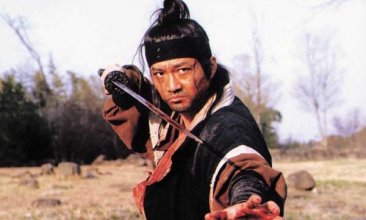 The film begins at the end of the Paekje Kingdom in the year 600 AD where soldiers commit suicide out of respect for their king's loss of his kingdom. Then we jump 475 years later where over a dozen warriors commit to re-establishing their domain. They are up against Japanese samurai in their efforts to reclaim what was theirs, allowing for some swordfights. Sadly, what could have been Saulabi's saving graze, the choreography of the swordfights, becomes that which underscores how much this film underperforms. Considering that the choreographer, Takakura Eizi, had a longtime relationship with Akira Kurosawa, the fact that Saulabi can't hold a dinner knife to the better choreography in A Sword In The Moon is even more startling and disappointing.
The film begins at the end of the Paekje Kingdom in the year 600 AD where soldiers commit suicide out of respect for their king's loss of his kingdom. Then we jump 475 years later where over a dozen warriors commit to re-establishing their domain. They are up against Japanese samurai in their efforts to reclaim what was theirs, allowing for some swordfights. Sadly, what could have been Saulabi's saving graze, the choreography of the swordfights, becomes that which underscores how much this film underperforms. Considering that the choreographer, Takakura Eizi, had a longtime relationship with Akira Kurosawa, the fact that Saulabi can't hold a dinner knife to the better choreography in A Sword In The Moon is even more startling and disappointing.
Lee Hwan-kyung's screenplay and Moon's film are a bit of attempted myth-making. They wish to attach the myth of the Japanese samurai to that of the Korean saulabi, or bearers of the "spirit sword." This reference to a mythologized aspect of Japanese culture extends further with how the komun'go is utilized as a plot device. The komun'go is a large stringed musical instrument played while laid flat, what some may know as a "zither". Those who are familiar with a similar Japanese instrument, might be thinking to themselves, "Oh, you mean like the kotto, right?" And, yes, that's the point here, to establish another connection between something better recognized in its Japanese form. As Koudo (the very handsome Lee Sang-hoon - Windstruck, Mutt Boy) tells us in the subtitles, the komun'go is "similar" to the koto, "but has different origins." Osame (Uememya Masako) is drawn to Koudo by the sound of the komun'go. Although not drunk, which is the state of being a famous Korean calligrapher named Ch'u-sa claimed one must be in to appreciate the komun'go, Osame finds herself transfixed by its sound, surprised she could find an instrument that could compete with her country's koto. It is this instrument that brings these two together as lovers, and since Osame's father has promised her to the Japanese Lord of the area, this dooms both their fates.
Moon and Lee are obviously quite earnest in their attempts here to broaden the myths of South Korea against those of Japan, unfortunately, they are too earnest, too serious. Perhaps if the intensity was broken up with some humor, (there were a couple efforts but they fail miserably), this film may have survived as something watchable. However, as it stands presently, I cringe at the thought of a second viewing, barely able to withstand revisiting certain scenes to make sure my comments are supportable by the text. (I used to have this personal ethical rule that I must watch every film twice before I settled on my feelings about it. Films like Saulabi are the reason I've since tossed that rule aside.) Historians might be able to excavate more from this film, but unless you've chosen that professional or hobbyist path, I can't possibly recommend this. The soldiers at the beginning of this film who disemboweled and poisoned themselves when the Paekje Kingdom fell are the truly lucky ones, for they didn't have to stick around and watch the rest of this horrible film. (Adam Hartzell)
In summer 2000, young director Ryu Seung-wan became the talk of the Korean film industry for Die Bad, his debut film pieced together from four thematically-related 16mm short films. Die Bad's pacing, humor, and adrenaline-charged violence impressed even veteran directors, and it ended up becoming one of the most widely praised films of the year. A few months later, Ryu made a further impression with Dazimawa Lee, a 30-minute comedy shot on digital video and released over the internet, where it became a runaway hit. The film recorded over 1.5 million views and attracted a cult following for its grossly overstated spoof of 1970s action films.
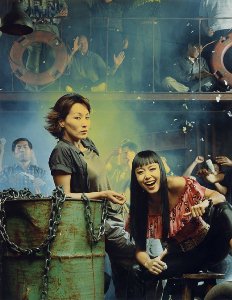 So when Ryu finally got around to making his first feature-length film, he was already somewhat of an industry darling. No Blood No Tears is the story of two tough women who get sick of being kicked around by the crooks in their life, and decide to steal a bagful of money. Starring one of today's top actresses in Jeon Do-yeon and a major star from the 1980s in Lee Hye-young, the two promised to deliver Korea's first "women's action buddy movie", and the film was expected to become a popular hit.
So when Ryu finally got around to making his first feature-length film, he was already somewhat of an industry darling. No Blood No Tears is the story of two tough women who get sick of being kicked around by the crooks in their life, and decide to steal a bagful of money. Starring one of today's top actresses in Jeon Do-yeon and a major star from the 1980s in Lee Hye-young, the two promised to deliver Korea's first "women's action buddy movie", and the film was expected to become a popular hit.
It was not to be so. Although certainly not a bomb at the box-office, it did less than what most people were expecting, and it seems to have been quickly forgotten. This is a shame, because even though it wasn't a crowd-pleaser, No Blood No Tears is forceful, well-crafted, and distinctively grim.
Perhaps the film's biggest achievement is the look and mood it creates. Marketed as a "pulp noir", the movie features gorgeous dark lighting and colors, with strong doses of violence. At first, the story jumps about from past to present before settling down to present its complex plot filled with detours and reversals.
It also features a rich array of unique and twisted personalities. The obsessed boyfriend hell-bent on revenge is played masterfully by Jung Jae-young from Guns & Talks. Making an impressive acting debut is Jung Du-hong, Korea's most accomplished action director who has worked on a wide number of films from Musa to The Foul King. His moves in this film show clearly why he is so respected. The director's younger brother Ryu Seung-beom, one of the hottest acting talents in the industry, also takes a role, together with a number of older actors who became famous for their action roles in the 1970s.
One thing the film does not have is the amount of humor seen in Ryu's previous works. It also fails somewhat to deliver on its claim of being a women's action movie, with the women getting roundly beaten up for just about the whole film. In this sense the finished product has not been what people were expecting, but it is nonetheless an entertaining, visceral treat. (Darcy Paquet)
Amongst the year's biggest disappointments was seeing this underrated film completely vanish from theaters, just a few days after release, crushed by Hollywood blockbusters and big Korean films. Director Im Jong-jae's My Beautiful Days is one of those understated dramas that doesn't really fit conventional (commercial or arthouse) canons, which seems to spell box
office trouble in the current climate of Korean Cinema. The film mixes commercial aspects next to subtle performances, and a realistic characterization. The final result might seem of little importance to impatient viewers, waiting for something exciting to happen. Quite frankly, nothing much happens indeed; but it's what the characters experience during this timespan, how they grow out of it, which makes this film interesting.
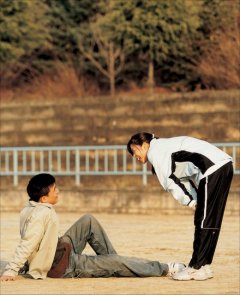
More than a simple love story, this is a voyage through a particular phase of adulthood, when people in their mid twenties (the Korean title means "24") aren't sure yet of what to do with their future. This uncertain period when doubts and fears arise often leads people to stay still, afraid of their ever changing life. The story centers around Jun-i (Kim Hyun-sung, of Resurrection of the Little Match Girl fame), a civil servant near the end of his duty. He spends his free time working for Jun-i's (Myung Kay-nam) dry cleaners store, living with the only person he could call friend. He also has an affair with an older, married woman (Pang Eun-jin); the two rarely communicate, and their relationship seem solely based on sexual attraction. Past the characters' introduction, the film intertwines in a rather effective way the emotional problems of the two men named Jun-i. Young Jun-i meets his ex-girlfriend (Byun Eun-jung), who introduces him to her sister (Kim Min-sun). He is instantly attracted by her vitality and joy of life. What seems to intrigue him the most is her confidence and determination to achieve her goals, something he clearly lacks, and couldn't find in his previous companions. The older Jun-i is living in an emotional limbo of his own, escaping his past loves (a woman, and painting), surviving day by day by ironing shirts and talking with his younger aide.
The film moves smoothly to conclude those relationships' arc, but it's not a conventional cathartic ending. It leaves the viewers with questions, and what we witnessed seems more like a portrayal of how it feels to grow up; the mistakes we make, the encounters and relationships we experience. This is not a film that pulls you in, like many melodramas do. What matters is the fact people will most likely relate with the characters' way of coping with this difficult period of their lives. While Kim Min-sun takes her role a little too literally, overacting on many occasions, most of the rest of the cast gives fine performances. In particular, Myung Kay-nam is much different - and better - than his usual quick cameos in countless films (The Foul King, My Wife is a Gangster, Go, and many others), and Pang Eun-jin does a tremendous job of conveying her character's state of mind, trying to regain her youth through her sex-based relationship with the younger, inexperienced Jun-i.
My Beautiful Days is a small, unambitious film. It doesn't have exciting plot developments, nor a conventional happy/sad payoff. But, thanks to fine performances, an interesting structure, and a fine soundtrack (by Lee Byung-woo, who wrote the score for My Beautiful Girl, Mari), it could be a rewarding experience for those who decide to give it a chance. (V. "x" Naldi)
Director Hong Sangsoo has maintained his signature style throughout all four of his critically-acclaimed films, but with each new work he provides us with a different twist. Whereas in Virgin Stripped Bare by Her Bachelors he plays with the idea of memory, in his latest work Turning Gate, Hong seems to be focused on the idea of comedy. Although there has always been a degree of humor in his films, here it takes center stage.
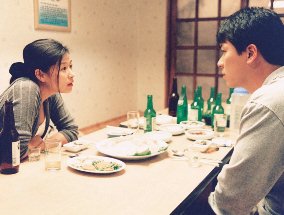 Once again, the film is structured around a remarkably simple, almost arbitrary, plot: after the dismal failure of his latest movie, an actor leaves Seoul on a trip, and manages along the way to land two different women in bed. Neither he nor the two women seem to learn anything from their experiences, but the time they spend together proves to be very revealing, for the viewers at least.
Once again, the film is structured around a remarkably simple, almost arbitrary, plot: after the dismal failure of his latest movie, an actor leaves Seoul on a trip, and manages along the way to land two different women in bed. Neither he nor the two women seem to learn anything from their experiences, but the time they spend together proves to be very revealing, for the viewers at least.
Although by no means a blockbuster, this has been Hong's most successful work at the box-office to date, with its humor making it far more accessible than his previous films. It cannot really be called lighthearted, however: much of the movie's strength comes from the tension between the humor and the underlying bleakness of the situations it presents. Some viewers may even feel it to be mean-spirited, as Hong seems to be laughing at, not with, his characters.
Yet there is an exhilaration in how the film is put together, with its economical style that dispenses with all but the most essential scenes and situations. As we proceed to the second half of the film, we start to see and hear echoes from the first. A visit to a fortune-teller provides the film's climax, then when it draws to a close, the music that accompanies the ending credits grounds the viewer immediately with its dreary, indifferent tone.
The film's stars Kim Sang-kyung and Yeh Ji-won worked previously in the realm of TV dramas, with only Choo Sang-mi (Say Yes, The Soul Guardians) having any prior film experience. Yeh Ji-won is particularly memorable for her forthright, slightly neurotic portrayal of our hero's first conquest.
Hong's latest film provides an interesting mix of popular and arthouse sensibilities, and internationally, too, it is likely to attract wider audiences than his previous films. Although at first glance it may appear to contain less intellectual meat than what we normally expect from Hong, in terms of genre it represents an interesting and significant departure. (Darcy Paquet)
After the smashing success of his breakthrough film Joint Security Area (2000), director Park Chan-wook had the opportunity to make just about any kind of movie he wanted. His ultimate decision was to go back to a scenario he had written in the mid-1990s: a grim, violent tale about the kidnapping of a young girl and the father who sets out for revenge. Back in 1995, Park didn't have a chance of finding someone to fund such a film... after JSA, however, he was practically handed a blank check. The end result is wondrous and horrible, a movie that will give you nightmares but leave you in awe of its power.
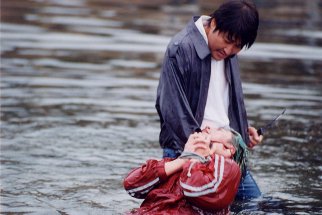 Sympathy for Mr. Vengeance opens with the narration of Ryu, a deaf man with bleached green hair who works in a smelting factory. Ryu is desperate to find a kidney transplant for his dying sister, and he assures her he will do everything in his power to save her. When his initial plans fail, however, he and his girlfriend, a leftist with radical views, find themselves contemplating the unthinkable.
Sympathy for Mr. Vengeance opens with the narration of Ryu, a deaf man with bleached green hair who works in a smelting factory. Ryu is desperate to find a kidney transplant for his dying sister, and he assures her he will do everything in his power to save her. When his initial plans fail, however, he and his girlfriend, a leftist with radical views, find themselves contemplating the unthinkable.
Of the film's many strengths, the first to stand out is its cast. After playing the two North Korean soldiers in JSA, Song Kang-ho and Shin Ha-kyun return, this time aligned against each other. They are joined by one of the hottest young actresses in the industry, Bae Doona, in the role of Ryu's girlfriend. All three actors possess great talent, and are well-directed by Park. The film's cinematography is remarkable too, achieving an ordinary but utterly distinctive look. The movie is shot almost entirely in daylight, with little camera movement and almost no music.
Before this film was released, word leaked out about its grim tone, and viewers who may have originally hoped for JSA 2 largely stayed away. The local critical response was highly mixed; some gave the film great praise, while others criticized its excessive violence.
Joint Security Area also contained a fair share of pessimism and violence, however that film balances the dark moments with episodes of humor and warmth. Sympathy, however, does no such thing: it begins relentlessly pessimistic, and only grows more savage towards the end. It is ironic that much of the violence in this film finds its roots in love. This is no way dulls the film's edges, though -- viewers will find it very difficult to watch, but those with the stomach to sit through to the end will be treated to a rare artistic achievement. (Darcy Paquet)
With the unexpected box-office success of her second feature, Lee Jeong-hyang has now earned the title of Korea's most commercially successful woman director. Although the widespread popularity of her debut film Art Museum by the Zoo can in part be attributed to star actress Shim Eun-ha, her latest work The Way Home offers nothing more in star power than a 7-year old boy and a 77-year old grandmother. Based purely on its strengths in storytelling this film has become a popular and beloved feature in its home country.
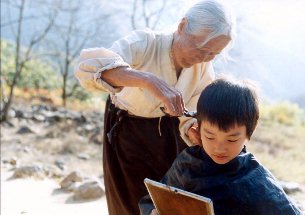 The Way Home opens with a single mother who, faced with financial troubles, decides to leave her seven-year son with his mute grandmother in the countryside. Having run away from home at a young age, the mother introduces the two to each other for the first time and then leaves for the city. The boy is furious at this upheaval in his life, taking out his frustrations by misbehaving and making wild demands of his grandmother.
The Way Home opens with a single mother who, faced with financial troubles, decides to leave her seven-year son with his mute grandmother in the countryside. Having run away from home at a young age, the mother introduces the two to each other for the first time and then leaves for the city. The boy is furious at this upheaval in his life, taking out his frustrations by misbehaving and making wild demands of his grandmother.
The film was shot in a remote village of only eight households, with amateur actors taking all the roles save that of the young boy. Kim Ul-boon, the woman who plays the grandmother, was scouted from another village when the director spotted her walking down the road. Having never seen a movie before in her life, she nonetheless proved to be a talented and devoted actress, and she has since become a minor celebrity.
Apart from being a mainly personal story, The Way Home also highlights the world of difference that exists between rural and urban Korea. Without being preachy, the film manages to highlight some of the aspects of rural life that have been lost in the course of development. The film's main strength remains its storytelling, however. Although the plot contains few surprises, it develops in such natural fashion that it doesn't feel like a story is being told at all.
I admit I was shocked to see how well this film performed at the box-office when it was released in April. When you watch it, it seems to contain not a trace of commercialism, yet it managed to outperform both Hollywood blockbusters and star-studded local movies to land at #1 in the box-office. A small chunk of hope for those who support modestly-packaged films. (Darcy Paquet)
Marriage is a Crazy Thing is a fascinating film. Based on Yi Man-gyo's award-winning novel and directed by the poet Yu Ha, best known for the collection of sardonic, laid-back, "postmodern" poetry entitled On a Windy Day We Must Go to Apgujeong-dong, (which he also adapted into a movie in 1993) it was a surprise sleeper of the spring season, attracting more than one million viewers nationwide and besting such big-budget competitors as Chihwaseon and Funny Movie at the box office.
 The movie consists of a series of vignettes concerning a love affair between Joon-yeong, (Kam Woo-seong) a college lecturer of English literature and confirmed bachelor, and Yeon-hee, (Uhm Jung-hwa) an interior designer looking for a happy marriage and a hot romance. After a less-than-impressive blind date, Joon-yeong and Yeon-hee come to realize that they make a fabulous couple: they have terrific sex, are great conversational partners, have complimentary tastes in people, clothing and food, and generally enjoy each other's company. They may even have fallen in love, God forbid. However, Yeon-hee turns out to be serious about having a financially rewarding marriage. She is not about to sacrifice her life to some cockamamie idea of "true love." Joon-yeong, equally adamant about not committing himself to the shackles of marriage, will soon find out just how determined Yeon-hee is to have her cake and eat it too.
The movie consists of a series of vignettes concerning a love affair between Joon-yeong, (Kam Woo-seong) a college lecturer of English literature and confirmed bachelor, and Yeon-hee, (Uhm Jung-hwa) an interior designer looking for a happy marriage and a hot romance. After a less-than-impressive blind date, Joon-yeong and Yeon-hee come to realize that they make a fabulous couple: they have terrific sex, are great conversational partners, have complimentary tastes in people, clothing and food, and generally enjoy each other's company. They may even have fallen in love, God forbid. However, Yeon-hee turns out to be serious about having a financially rewarding marriage. She is not about to sacrifice her life to some cockamamie idea of "true love." Joon-yeong, equally adamant about not committing himself to the shackles of marriage, will soon find out just how determined Yeon-hee is to have her cake and eat it too.
Told from the viewpoint of Joon-yeong, punctuated by his droll observations about himself, Yeon-hee and the people around them, Marriage is nearly totally purged of melodramatic conventions, and shies away from dramatic emphasis of any kind as well. Characters don't die, scream obscenities or slap the faces of their partners in this movie. Its rhythm simulates that of a real-life relationship, complete with dull patches and sudden intensifications. Director Yu resolutely refuses to judge his characters, keeping the narrative open-ended to the very last shot. Although self-reflexive and ironic, Marriage is not modernist or "experimental" in the manner of, say, Camel(s). It does not appear to take its "messages" too seriously, but somehow, by the end of the movie, the viewers are led by this shrewd concoction to reflect on the nature of human relationship and the happiness to be found therein.
The movie is terrifically cast. Uhm Jung-hwa, referred to in some circles as the "Madonna of Korea," whatever that means, is perfect as Yeon-hee, bold, attractive and perhaps more than a little manipulative: imagine a beautiful, svelte flower with slightly animal-like fragrance... and maybe carnivorous, to boot. Kam Woo-seong is at once bland and sly: his restrained performance prevents us from figuring out what is going on in Joon-yeong's mind. At one point, a cute student admirer steals a kiss from Joon-yeong's lips: his response is a poker-faced stare that tells us almost nothing. Still, Kam manages to snare our sympathy for Joon-yeong and, in the bittersweet climax of the film, we share the character's sense of isolation and regret. Marriage's (now infamous) sex scenes are extremely graphic but presented so naturally, they become oddly endearing, shorn of any sense of embarrassment. (Too Young to Die may make an interesting comparison in this respect)
Marriage will inevitably leave some viewers confused or bored: its unhurried approach to storytelling may be construed as lack of energy or verve, and its specifically metropolitan, Seoulite milieu may be an alienating factor, in the way certain movies set in New York City have a limited appeal in North America. Nonetheless, viewed with an open mind, the film is not only charming and engaging, but also unexpectedly honest and touching. After watching it, I found myself wondering what I would have done in Joon-yeong's shoes, and if I were a woman, whether I could have gone through with Yeon-hee's choices. Oasis and One Fine Spring Day may be cinematically superior, but the seemingly (and deceptively) under-achieving Marriage may yet diverge the truths about contemporary Korean lives that even these masterpieces do not. (Kyu Hyun Kim)
Jang Seung-eop is a Korean painter who lived in the late 19th century, famed as much for his irreverent lifestyle as for his brilliant artwork. Born into the lower classes, he never felt at ease amidst the nobility who grew to covet his work, and his reputation for drinking and womanizing are some of the few known details about his life. Only a fraction of his artworks remain, but although he is not as famous as some other Korean painters, art experts continue to hold his work in high regard.
 Following the glittering international reception of his 97th film Chunhyang, which competed at Cannes and performed well in a North American release, veteran director Im Kwon-taek turned to Jang Seung-eop for the subject of his next feature. The relative lack of knowledge about the painter's life provided scope for Im's imagination to run free, and the end result is less a researched presentation of Jang's life than it is a rumination on art, artists, and society.
Following the glittering international reception of his 97th film Chunhyang, which competed at Cannes and performed well in a North American release, veteran director Im Kwon-taek turned to Jang Seung-eop for the subject of his next feature. The relative lack of knowledge about the painter's life provided scope for Im's imagination to run free, and the end result is less a researched presentation of Jang's life than it is a rumination on art, artists, and society.
The film's opening prepares us for the overall mood of the work: a closeup of a brush as it moves frantically and chaotically across a thin sheet of paper, creating gorgeous images at great haste. The film too is propelled forward at a similar speed, expressing the impatient creation of the artist rather than the leisurely consumption of the work by its patrons. Together with cinematographer Jung Il-sung, Im creates fantastic imagery in this film, from the many shots of the artwork itself to landscapes and costumes that burst with color. More than anything else this film succeeds as a rich visual feast.
What struck me most about the depiction of Jang's tragically-imagined life was the director's tendency towards romanticism, in his seeming desire to present the artist as a Korean Byron or Liszt. Jang's rebellious nature and bellowing at the sky contain echoes of other films about artists like Vincent & Theo and Camille Claudel. The film is set in the turbulent historical backdrop visited by Im's earlier film Kaebyok: Fly High, Run Far, but without a solid knowledge of Korean history, many viewers may feel overwhelmed, and will gain little from the captions which reference China and Japan's struggles over a weakened Korea.
Jang is played by the immensely talented Choi Min-shik, and his performance is robust, although rumor has it that he and the director had conflicting ideas about how to portray the character. He is joined by an impressive supporting cast including Ahn Sung-ki as Jang's mentor and actresses Kim Yeo-jin, Yoo Ho-jung and Son Yeh-jin as the various women in his life.
I must say that personally I felt frustrated by this film, despite its strengths and the incredible artwork. Whereas Chunhyang could lay claim to presenting a highly original way of blending sound and story, Chihwaseon feels more like imitation, reinforcing popular images of artists and Asian culture that already exist in people's minds. The presentation of the Best Director award to Im at Cannes is a fitting recognition of his long and distinguished career. But he has produced much stronger work than this in the past -- films that get under your skin, rather than seducing you with their charms. (Darcy Paquet)
Jin-soo (Lee Jung-jae) works as an anchorman for the local weather channel. After a car accident, he develops a curious case of selective amnesia. He finds clues of a past relationship, and finally decides to search out the identity of the woman he loved, with the help of friends and past acquaintances. Yeon-hee (Chang Jin-young) seems to be the only one who's helping him seriously. As the pieces of the puzzle begin to fit together, and Jin-soo starts to remember his past, he realizes his current life isn't so bad after all. His quest to find the woman he loved years ago doesn't seem too appealing, especially because now there's someone else who cares about him.
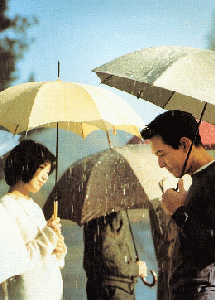 Over The Rainbow seems to admit its flaws right from the start. The plot is full of recurring themes from many melodramas and romantic
comedies, even borrowing music from films like The Wizard of Oz and Singing in The Rain. The dialogue is often a little clichéd, and sometimes the film tries too hard to be cute. Yet, there's one thing which works very well in this film: the chemistry between Lee Jung-jae and Chang Jin-young is excellent. You never get the feeling that this is merely an artificial star vehicle with manipulative plot devices and sappy music, because the actors make it feel real, and defeat boredom with their charm.
Over The Rainbow seems to admit its flaws right from the start. The plot is full of recurring themes from many melodramas and romantic
comedies, even borrowing music from films like The Wizard of Oz and Singing in The Rain. The dialogue is often a little clichéd, and sometimes the film tries too hard to be cute. Yet, there's one thing which works very well in this film: the chemistry between Lee Jung-jae and Chang Jin-young is excellent. You never get the feeling that this is merely an artificial star vehicle with manipulative plot devices and sappy music, because the actors make it feel real, and defeat boredom with their charm.
Director Ahn Jin-woo's tendency to favor exposition over pure acting skills and on-screen chemistry starts to hurt the film around its middle portion. There are too many flashbacks, not all required to understand what's happening. It seems like the director doesn't trust its audience, and thus provides all the answers to the film's rather convoluted plot.
The film has excellent moments though. Whenever the leads are on screen alone, Over The Rainbow improves by leaps and bounds. Even with the conventional step-by-step romance arc, we still care about them. Lee Jung-jae is no stranger to characters like this (Last Present, Il Mare), but it's Chang Jin-young who shines here, with a lively performance. Also, despite the film's traditional approach to storytelling, it never really feels overly manipulative. There's always a good hybrid between sympathetic characters and a slight detachment which allows us to see things more clearly.
The director gives good space to the minor characters as well. Kong Hyung-jin once again shows he's emerging from obscurity with another fine performance. And, even if the rest of the university photography club is a collection of clichés on paper, the relaxed portrayal of the actors improves things substantially. Supported by fine music, nice scenery and a decent recreation of the mid 90s -- like the popularity of Roora -- Over The Rainbow could appeal to many fans of the genre. Sadly its evident flaws are hard to overlook, but a nice finale and the leads' charming chemistry will nonetheless make it a worthwhile experience. Just don't expect a great film. (V. "x" Naldi)
No Comment is an omnibus film consisting of three short subjects, directed by three newcomers. Produced and partially written by Jang Jin, it shares the quirky comic tone of his directorial efforts such as The Spy Lee Cheol-jin (1999) and Guns & Talks (2001). The main attraction for this feature is its colorful all-star cast: Ryu Seung-bum, Jeong Jae-yung, Im Won-hee and Shin Ha-kyun all play radically different characters in the three chapters, ably assisted by veteran supporting actors from stage and TV.
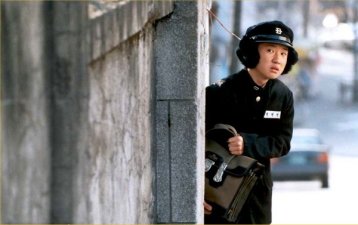 The first short, "Enemies in Four Directions," (directed by Park Sang-won) has most frequently been praised among Korean critics, probably due to its uproariously funny "fake" slow motion footage in the climax. This sequence is indeed nifty. A bunch of thugs, an assassin who uses a pile driver as a weapon of choice, a young gigolo (Shin Ha-kyun) and his housewife "customer," and other motley crew of guests converge in a hotel, creating havoc for one another through a series of misunderstandings and identity confusions. Jang Jin's own screenplay appears to make fun of Quentin Tarantino's "situational noir" (especially his ludicrous misfire Four Rooms), but the characters do not come alive, the gags fall flat (way too much time is spent on an overflowing toilet) or are actively distasteful (Jeong Jae-yung plays a stalker who pours gasoline all over a sleeping woman, the object of his obsession, and then has a fit because he cannot obtain one single matchstick to start the fire. Very funny, no?). The aforementioned trick with slow motion and Ryu Seung-bum's ultra-charming performance as the harassed concierge are the main strengths of this segment.
The first short, "Enemies in Four Directions," (directed by Park Sang-won) has most frequently been praised among Korean critics, probably due to its uproariously funny "fake" slow motion footage in the climax. This sequence is indeed nifty. A bunch of thugs, an assassin who uses a pile driver as a weapon of choice, a young gigolo (Shin Ha-kyun) and his housewife "customer," and other motley crew of guests converge in a hotel, creating havoc for one another through a series of misunderstandings and identity confusions. Jang Jin's own screenplay appears to make fun of Quentin Tarantino's "situational noir" (especially his ludicrous misfire Four Rooms), but the characters do not come alive, the gags fall flat (way too much time is spent on an overflowing toilet) or are actively distasteful (Jeong Jae-yung plays a stalker who pours gasoline all over a sleeping woman, the object of his obsession, and then has a fit because he cannot obtain one single matchstick to start the fire. Very funny, no?). The aforementioned trick with slow motion and Ryu Seung-bum's ultra-charming performance as the harassed concierge are the main strengths of this segment.
The second short, "My Nike," (directed by Park Kwang-hyeon) in contrast, is a modest, gentle but savvy evocation of an urban lower-middle class family life in 1980s Korea. The chapter is told from the POV of a young junior high school student (Ryu Deok-hwan) whose greatest desire in the world is to own a pair of Nike sneakers. Instead of going for belly laughs, Director Park piles up authentic but droll character observations, which remain surprisingly warm and touching. Underlying them is a sense of pathos about class differences based on consumption patterns of the '80s, when Korea was first becoming an out-and-out consumer society and its people were beginning to be defined by what they buy and own. Even the "surprise" denouement has a delicious satirical tang missing from other segments. "My Nike" is also gorgeously photographed and cleverly edited, ironically very much in the mold of good CFs, (Park had previously directed commercials for McDonald's Korea, among other companies) including a stunning reference to E.T. The Extraterrestrial, by itself almost worth the price of admission.
The third short, "The Church Sister," (directed by Lee Hyeon-jong) stars Kim Il-yong (YMCA Baseball Team) as a young soldier on a vacation leave. He is secretly in love with the friendly and beautiful "big sister" from the Sunday school, whom he has known since childhood (played by Park Seon-young, also in Addicted but most familiar from TV dramas). They go see a movie (a spoof of Wong Kar-wai's Happy Together), eat lunch together, walk around the neighborhood aimlessly, waiting for the train to carry him off to the barracks. Will he confess his true feelings to her in time? The chapter is a dead-on parody of an eternally recycled situation in Korean TV dramas: the tearful parting of true lovers! (Cue violin music: eee eee eee~~~) The sucker-punch "twist" ending is so abjectly, stupefyingly silly that some TV drama fans may take offense, although both I and my wife were rolling on the floor convulsing with laughter.
The lowdown: "Enemies" and "The Church Sister" are essentially one-joke films, amusing but forgettable. "My Nike," on the other hand, is, along with Conduct Zero (2002), the best '80s-nostalgia piece I have ever seen in Korean cinema. On the strength of this chapter alone, I would give high marks to No Comment. While not an earth-shaking masterpiece, No Comment is an attractive way to showcase talents of up-and-coming filmmakers not yet considered "safe" to take on big-budget projects: a creative triumph for producer Jang Jin. (Kyu Hyun Kim)
Many Korean directors have made a name for themselves in short film before going on to make feature films. Director Kim Dong-won took this one step further, first shooting an acclaimed 16mm short film '82, Haejok Becomes a Disco King, and then four years later rewriting and expanding it into his feature debut. Surprisingly, the end result feels not at all like a stretched-out short. By turns silly, raunchy, old-fashioned, and cute, Bet On My Disco is one of the comic discoveries of the year.
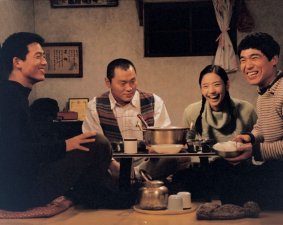 Set in 1982, the story focuses on Haejok, Sung-ki and Bongpal -- three high school boys in a rural village who spend their time drinking whiskey and stealing recyclables for spare change. Misfortune strikes when Bong-pal's father, who scoops out outhouses for a living, is injured and unable to work. Desperate for money, Bongpal takes over his father's job, while his younger sister secretly gets a job at a local hostess bar. After discovering this, the boys utilize everything at their disposal to try and save her: their fists, their brains, and ultimately... disco.
Set in 1982, the story focuses on Haejok, Sung-ki and Bongpal -- three high school boys in a rural village who spend their time drinking whiskey and stealing recyclables for spare change. Misfortune strikes when Bong-pal's father, who scoops out outhouses for a living, is injured and unable to work. Desperate for money, Bongpal takes over his father's job, while his younger sister secretly gets a job at a local hostess bar. After discovering this, the boys utilize everything at their disposal to try and save her: their fists, their brains, and ultimately... disco.
Despite the amusing twists and turns of the plot, Bet On My Disco ultimately relies on its motley crowd of personalities to leave the biggest impression. The film benefits most from its casting -- a nice mix of veteran actors and newcomers -- as well as the various quirks and mannerisms that define each character. There is a bit of an ironic bite to the movie as well; unfortunately, an excess of sugary filler music dulls its edges. (The disco music, on the other hand, is first class.)
Released at the beginning of June, this film roared out of the gate at the box-office and then crashed to a stop as the World Cup seized the nation's attention. Fans of dorky comedies are advised to search this film out when it's released on home video. (Darcy Paquet)
Big-budget sci-fi extravaganza Yesterday is the first of the infamous three "big bombs" that detonated at the Korean box-office in mid-2002. As with R U Ready? and Resurrection of the Little Match Girl, Yesterday was highly expensive by Korean standards and a major disappointment at the box-office. Nonetheless, Yesterday came out much better than its partners in infamy, with the lowest budget ($5m) and the highest box-office ($2m) of the three. You could even partially blame the poor box-office on its being released during the World Cup.
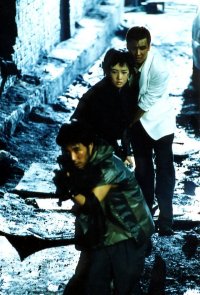 Without question, this film has some problems. Trying to create a distinctive mood, the director had the characters mumble their lines throughout the film, which caused intense frustration for Korean speakers who couldn't understand what they were saying (non-Koreans watching the film in translation will not have to worry about this, however). The plot, set in the year 2020 in an "inter-city" on the border between China and a re-unified Korea, revolves around a series of mysterious kidnappings, and the investigators who search for the identity and motives of the criminal. Viewers, showered with far-flung details, will struggle to follow the plot and piece together what is happening. When the film moves to its climax, however, they will realize that it was all a rather simple, cliche-ridden story anyway that wasn't worth the mystery.
Without question, this film has some problems. Trying to create a distinctive mood, the director had the characters mumble their lines throughout the film, which caused intense frustration for Korean speakers who couldn't understand what they were saying (non-Koreans watching the film in translation will not have to worry about this, however). The plot, set in the year 2020 in an "inter-city" on the border between China and a re-unified Korea, revolves around a series of mysterious kidnappings, and the investigators who search for the identity and motives of the criminal. Viewers, showered with far-flung details, will struggle to follow the plot and piece together what is happening. When the film moves to its climax, however, they will realize that it was all a rather simple, cliche-ridden story anyway that wasn't worth the mystery.
So forget the story. This film will be best remembered for its visuals, highly accomplished special effects and well-executed action set pieces. Director of Photography Jung Han-chul deservedly won a Silver Prize from his contemporaries at the Golden Cinema Festival for his gorgeous, convincing cinematography (The Phone took the top prize). The futuristic world presented to us in this film is engaging and darkly beautiful. Despite all that was said about the film's budget, the fact that they were able to create such imagery with $5m is sure to surprise most anyone. Finally, the crisply executed, realistic action sequences far surpass anything seen in other Korean blockbusters like Shiri or 2009 Lost Memories. They are a work of art in themselves that considerably outshine the film as a whole.
One hopes that debut director Jeong Yun-su gets a chance to make another movie. Yesterday is shot through with a sincere and robust ambition, and even if the film's weaknesses caused it to crash, the people who made it may go on one day to create something really special. (Darcy Paquet)
Towards the end of June, as Koreans revelled in the unexpected success of its World Cup soccer team, a film was released which brought viewers back to another of Korea's most famous sports moments, this one far more tragic. Champion tells the true story of Kim Deuk-gu, a poor man from the countryside who took up boxing and became one of the world's elite fighters. In 1982, after winning fame in the ring and marrying his first love, Kim travelled to Las Vegas to fight Ray "Boom Boom" Mancini, the reigning lightweight champion of the world. After 14 intense rounds in which Kim refused to give in, he fell into a coma from which he would never wake, changing the sport of boxing forever and throwing a nation into shock.
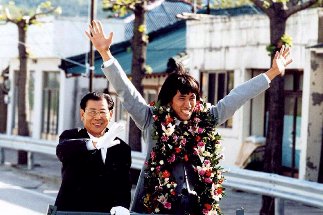 Director Kwak Kyung-taek, the man who created Korea's best-selling movie ever Friend, was a teenager when he saw this fight on TV. Like many Koreans who lived through that era, the event left a strong impression on him, and years later he decided to make a film in memory of Kim's determination and courage. "That was during an era when Korea was trying desperately to escape the poverty of the 60s and 70s, to cast off our reputation as a third world country," Kwak says. "For Koreans who remember him, Kim represents the last image of that generation and their hunger to succeed."
Director Kwak Kyung-taek, the man who created Korea's best-selling movie ever Friend, was a teenager when he saw this fight on TV. Like many Koreans who lived through that era, the event left a strong impression on him, and years later he decided to make a film in memory of Kim's determination and courage. "That was during an era when Korea was trying desperately to escape the poverty of the 60s and 70s, to cast off our reputation as a third world country," Kwak says. "For Koreans who remember him, Kim represents the last image of that generation and their hunger to succeed."
Most everyone in Korea already knows this story, so the drama surrounding the film's release centered not on how it would end, but rather how it would be told. The end result surprised a lot of viewers. Much less commercial than Friend, Champion seems to go out of its way to de-emphasize the boxing elements. The match's hold on the Korean populace is also represented in only a few scenes which suggest, rather than show, the event's historical importance. More than anything, Kwak focuses on personal aspects of the story: Kim's character, the bleakness of his life before boxing, and the heartbreaking impact of that final match on his family (Kim's mother later committed suicide, though this is left out of the film).
Kim is portrayed masterfully by Yoo Oh-sung, one of Korea's top actors who last starred in the film Friend. Apart from the physical transformation required for the role, which entailed months of intense bodybuilding, Yoo gives an emotional anchor to the story's at-times conflicting moods. Newcomer Chae Min-suh is also impressive as Kim's wife, in her first-ever acting experience.
Partly due to Friend, nostalgia for the 70s and early 80s is becoming a staple of recent Korean cinema. However, the portrayal of this era that Champion gives us is a far more sobering experience. It seems ironic that such a downbeat film should premiere just when the nation is feeling so optimistic, but Champion is a poignant reminder of how much has changed in Korea since 1982. (Darcy Paquet)
Ji-won (Ha Ji-won -- Nightmare, Sex Is Zero) is a journalist who has just finished a controversial expose on a ring of older men paying for sex with teenage girls. As a result, a man involved in this ring begins stalking her. Ji-won makes two efforts to escape this man's pursuit: she isolates herself within her best friend's, unfinished, second home and she gets a new cell phone number. While at an art museum with her friend, Ho-jeong (Kim Yu-mi -- The Doll Master), her friend's daughter Young-ju (Eun Seo-woo) answers a random call on Ji-won's cell phone. Something on the other end of the line appears to disturb Young-ju to the point where she releases a piercing scream within the reverberating walls of the museum. When Ji-won discovers that the previous owner of her cell phone died, her investigative skills are piqued.
 If, after that plot summary, you find yourself ringing up images from Hideo Nakata's Ringu, you won't be alone. However, if you only find yourself ringing up images of the Korean remake The Ring Virus, than you are alone. And if you are limited to visions of the American remake, The Ring, dancing in your head, you are an unfortunate example of American isolationism from the rest of the world's pop culture. (But then again, if such were the case, you wouldn't be reading this review, would you?) The obligatory said, there are obvious similarities between Ahn Byeong-ki's Phone and Ringu and its clones. But, since I scare easily, I don't watch many horror films that aren't Korean, so I am bizarre in that the only reference I have here is The Ring Virus. But I have enough of an understanding of the horror genre to see that similarities with other non-Ringu films may also be present here -- the ghost in the mirror, the Asian horror hair, etc.. Although not an exceptional film within the genre, Phone does add to some of the genre fixtures enough to feel like I'm not watching a complete re-take, such as the nice coupling of trapped-in-an-elevator-fear with the scratching of fingernails on the wall to enable the audience to feel the physical cringing the character experiences upon hearing the scream from the phone.
If, after that plot summary, you find yourself ringing up images from Hideo Nakata's Ringu, you won't be alone. However, if you only find yourself ringing up images of the Korean remake The Ring Virus, than you are alone. And if you are limited to visions of the American remake, The Ring, dancing in your head, you are an unfortunate example of American isolationism from the rest of the world's pop culture. (But then again, if such were the case, you wouldn't be reading this review, would you?) The obligatory said, there are obvious similarities between Ahn Byeong-ki's Phone and Ringu and its clones. But, since I scare easily, I don't watch many horror films that aren't Korean, so I am bizarre in that the only reference I have here is The Ring Virus. But I have enough of an understanding of the horror genre to see that similarities with other non-Ringu films may also be present here -- the ghost in the mirror, the Asian horror hair, etc.. Although not an exceptional film within the genre, Phone does add to some of the genre fixtures enough to feel like I'm not watching a complete re-take, such as the nice coupling of trapped-in-an-elevator-fear with the scratching of fingernails on the wall to enable the audience to feel the physical cringing the character experiences upon hearing the scream from the phone.
What I find most interesting in Phone is the use of the phone. Recently, Charles Spiteri, in the July/September 2004 issue of the excellent Australian online film journal Senses of Cinema, noted the transformation of the phone as an object of isolation in 1980's slasher films into an object of subjugation in the slasher films of the 90's. (Yes, slasher films are not exactly the same as ghost story films, but there are enough similarities between the genres that I'm going to allow this for now.) Phone is a choice example of this subjugation since the phone is the very media through which the ghost subjugates its victims. Another interesting article to bring into reading Phone is Ned Schantz's wonderful exploration of the Classical Telephone in Classic Hollywood Films, such as It's a Wonderful Life, in the Summer 2003 issue of Film Quarterly. There are two aspects of this article -- again, addressing films of different genres than that of Phone - I find applicable here. First, Schantz argues that "The telephone, at least in its most intimate mode, is female, ...", and the primary user-interfacers with the phone in Phone are women. In fact, one man's power is immediately deflected by the phone and it is Ji-won who is strangely - and this brings up a fault of the film since such seriously contradicts the internal logic - immune to its power. Second, Phone takes advantage "...of the phone's inherent potential to route interest along unpredictable lines, ..." Even with Caller ID, it is still possible for us to be fooled by phones, because we may not look at Caller ID when we are expecting a call from one person when it turns out to be another, as the film uses for humorous effect in the early car chase scene and for suspense throughout the film. Yet, and this may be where the ghost story diverges from the slasher story line, we can fool the phone as well, and by extension the caller. We often forget this, but we don't have to answer when our phone rings. And when we do choose to answer, we are quite adapt at being intentionally vague about where we are and what we're really doing, if not outright lying to the caller about our coordinates.
Besides addressing different genres, both Spiteri and Schantz are discussing American films; mostly old school, non-mobile phones; and American cultural uses of phone technology, so one must be cautious when applying their arguments to Korean films and cultures. The most obvious difference in how phones are used by South Koreans is the prevalent use of text-messaging functionality that still has yet to catch on with my fellow Americans. (This is not something unique about Koreans, but an absence of use that is unique about Americans.) Still, coupling Phone with Take Care of My Cat allows for interesting commentary on the specific ways Korean women intimately use cell phones. Also, the full use by Koreans of the multiple mediums that comprise the functionality of each new generation of cell phones, such as text-messaging and video-gaming, adds interesting layers to Schantz's statement that, "We must understand each call as ripe for the occurrence of multiple, contingent events." The multiple functionality added onto each mutation of cell phones extends the possibilities for "phone traffics in coincidence" (italics Schantz's) beyond just a call. Such is wonderfully underscored by the Korean-ized word for cell phones - haen-deu pon. The phone is no longer merely an extension of the ear and mouth, but our hands as well, manipulating our world as it manipulates us. (Adam Hartzell)
One of the most important consequences of the current boom in Korean Cinema is the emergence of female directors. Recently, Im Soon-rye's Waikiki Brothers, Jung Jae-eun's Take Care of My Cat, Park Chan-ok's Jealousy is My Middle Name, and Lee Jung-hyang's The Way Home were all well received by critics and invited to many festivals. All those films share something in common, they're all striving to give new life to genres which seemingly had nothing new to say. Stereotypes are only used to enforce a statement, like Take Care of My Cat's four girls who at first seem like walking cliches, but then develop, grow up under our eyes. The latest female director to join the ranks is Mo Ji-eun, who with her debut film A Perfect Match takes the romantic comedy - probably the most stereotyped genre of them all - and spins it in a new direction. It's still a cute, funny, and ultimately undemanding date movie, but this time seen through a woman's eyes.
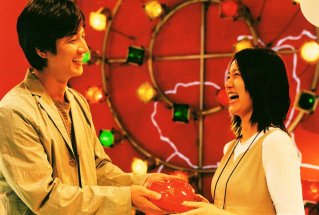 The first benefit we get from this new perspective is how female characters act. Couple manager Hyo-jin (Shin Eun-kyung) doesn't merely follow her soulmate forsaking everything else. She has a strong sense of community, and this is often more important to Hyo-jin than her feelings. She cares about her best friend (Kong Hyung-jin) so much she basically saves his marriage, avoiding an affair which could destroy both his current relationship, and their 20 years long friendship. Hyo-jin continues to give her best at work, trying to make other people happy, compensating for her own problems. She even pretends to have a boyfriend to not make her three 'sisters' worry. When Hyo-jin finally finds someone she's interested in, he's far from perfect. Hyun-soo (Jung Joon-ho) always arrives late, doesn't dress properly, and often looks detached from the real world. All he wants is a good girl who his mother will like. No love at first sight, fatal attraction type of romance.
The first benefit we get from this new perspective is how female characters act. Couple manager Hyo-jin (Shin Eun-kyung) doesn't merely follow her soulmate forsaking everything else. She has a strong sense of community, and this is often more important to Hyo-jin than her feelings. She cares about her best friend (Kong Hyung-jin) so much she basically saves his marriage, avoiding an affair which could destroy both his current relationship, and their 20 years long friendship. Hyo-jin continues to give her best at work, trying to make other people happy, compensating for her own problems. She even pretends to have a boyfriend to not make her three 'sisters' worry. When Hyo-jin finally finds someone she's interested in, he's far from perfect. Hyun-soo (Jung Joon-ho) always arrives late, doesn't dress properly, and often looks detached from the real world. All he wants is a good girl who his mother will like. No love at first sight, fatal attraction type of romance.
With this role, Shin Eun-kyung goes back to what got her started. Prior to being cast for a daring role in Im Kwon-taek's Downfall, she starred in many romantic comedies and melodramas like Cho Geum-hwan's Singing in The Rain in 1994 (ironically co-starring Kong Hyung-jin). Her vulnerable, charming portrayal of a woman torn between her social responsibilities and her personal feelings is excellent. Unlike many other 'beauty queens' of Korean Cinema, she still can play the girl next door type without looking phony. Kong Hyung-jin really makes an impression as Hyo-jin's best friend, and this might very well be his breakthrough film. After countless small roles in films like Failan, Last Present, and Peppermint Candy, he's finally starting to get noticed by both critics and public. Unlike what the poster of the film suggests, Jung Joon-ho is no more than a supporting character, although he gives a good performance. This is one of the best things about the film, Hyo-jin's many facets of life (love, friends and work) are all having an equal voice in the story.
The film works better as view of how women in their late 20s approach relationships. It doesn't follow a linear storytelling structure where the lovers meet obstacles they have to overcome. It does have a happy ending, but even there the director makes fun of the most overused plot device in Cinema history. Beneath all the cutesy and charm of the leads, the irreverent take on supporting characters - who are cliches, yet poking fun at themselves they aren't - and the silly comedy, there's something intelligent. Many films try to show romance through a female perspective, but it's only a facade to manipulate their sensibilities. A Perfect Match seems to have an answer to the long-debated question. What do women want? If this film's Korean title is anything to go by, they might just want to be introduced to a good person. (V. "x" Naldi)
For better or for worse, the historical development of Korean cinema has been linked to the genre of melodrama, in much the same way that people think of martial-arts films in relation to Hong Kong. It's not just that there have been a large number of popular or influential melodramas produced throughout Korean film history; the genre has influenced directors in other ways as well. Green Fish and Peppermint Candy, the first two films by novelist-turned-director Lee Chang-dong, both contain highly emotional scenes, but the films strive to avoid melodramatic influences so much that you could consider them to be 'anti-melodramas'.
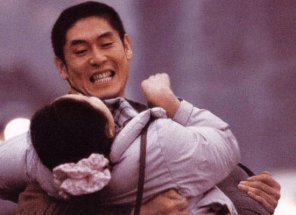 For his third film Oasis, Lee seemingly changed course and decided to make a love story: a melodrama rooted in the relationship between a social misfit just released from prison and a woman with cerebral palsy. What seems on the surface to be a depressing tale of squalor is actually one of the most amazing films Korea has produced in years, a triumph for Lee and his cast.
For his third film Oasis, Lee seemingly changed course and decided to make a love story: a melodrama rooted in the relationship between a social misfit just released from prison and a woman with cerebral palsy. What seems on the surface to be a depressing tale of squalor is actually one of the most amazing films Korea has produced in years, a triumph for Lee and his cast.
Oasis begins in mid-winter when a man named Jong-du (Sol Kyung-gu) is released from prison wearing summer clothes. He served time for a drunk driving accident in which another man is killed, but his decreased mental capacities seem to leave him unable to understand how the incident has impacted others. After a half-hearted reunion with his family, he takes a visit to the home of the man he killed.
There he meets a woman named Gong-ju (Moon So-ri), whose name means "princess" in Korean. Afflicted with a severe case of cerebral palsy, Gong-ju is more or less confined to her room, talked at occasionally but otherwise ignored. Jong-du takes an interest in her immediately, and despite being thrown out, resolves to return later when he knows she will be alone...
It's hard to write about this film without commenting on the acting by the two leads, reunited after their turn in Peppermint Candy. Many will be struck by the challenge met by Moon So-ri in portraying a severely handicapped woman, but Sol Kyung-gu has also given tremendous life to his character, and the two of them together are brilliant. Much of the film's appeal comes in watching the two of them interact.
But more than anything else this film comes across as an anguished appeal by director and writer Lee Chang-dong, who has made such tremendous strides in his first three films that he has to be considered one of Korea's very best filmmakers. Oasis makes you look at the assumptions and prejudices of the society around us in a completely new light, and it may be looked back on one day as the pinnacle of Korean filmmaking from this era. (Darcy Paquet)
Despite its current maligned status, the omnibus horror format has a long and distinguished history behind it, from Histoires extraordinaires (1968), where European giants Louis Malles, Roger Vadim and Federico Fellini try their hands at adapting Edgar Allan Poe for screen, to the theatrical version of the creepy and whimsical Japanese TV series Tales of the Unexpected (2000), with shades-wearing Tamori deadpanning as the host-narrator from beyond. Three adds a cosmopolitan wrinkle to the anthology format, by having its three components directed by talented, up-and-coming filmmakers from South Korea, Thailand and Hong Kong.
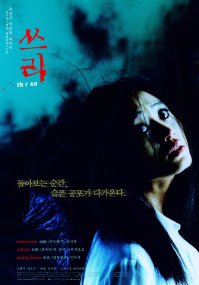 "Memories," directed by Kim Jee-woon (The Quiet Family [1997], The Foul King [2000]) was probably a trial run for some of the ideas featured in A Tale of Two Sisters (2003). An upper-middle class salaryman (Cheong Bo-seok) has trouble remembering the specifics of the night when his wife left him: he is worried that something terrible has happened to her. Meanwhile, his wife (Kim Hye-su) finds herself stranded in an anonymous road, also unable to recollect recent events. Kim crams a lot of cinematic techniques into this short film, some of which provide more than a few good jolts, such as the nightmarish prologue with its long, continuous shots and virtuoso lighting. The most impressive achievement is the film's looks: Kim and his team, including cinematographer Alex Hong (Il Mare [2000], The Foul King) and production designer Jeong Gu-ho, captures the menacing atmosphere of a hideously bleached, barren high-rise apartment complex. "Memories" is frightening but not very original. The influence of contemporary Japanese horror is pretty obvious: those familiar with Ring (1998: NOT the American version released in 2002) and Audition (2000) in particular may feel a sense of deja vu.
"Memories," directed by Kim Jee-woon (The Quiet Family [1997], The Foul King [2000]) was probably a trial run for some of the ideas featured in A Tale of Two Sisters (2003). An upper-middle class salaryman (Cheong Bo-seok) has trouble remembering the specifics of the night when his wife left him: he is worried that something terrible has happened to her. Meanwhile, his wife (Kim Hye-su) finds herself stranded in an anonymous road, also unable to recollect recent events. Kim crams a lot of cinematic techniques into this short film, some of which provide more than a few good jolts, such as the nightmarish prologue with its long, continuous shots and virtuoso lighting. The most impressive achievement is the film's looks: Kim and his team, including cinematographer Alex Hong (Il Mare [2000], The Foul King) and production designer Jeong Gu-ho, captures the menacing atmosphere of a hideously bleached, barren high-rise apartment complex. "Memories" is frightening but not very original. The influence of contemporary Japanese horror is pretty obvious: those familiar with Ring (1998: NOT the American version released in 2002) and Audition (2000) in particular may feel a sense of deja vu.
"Wheel" seems to start out as a variation on one of the most oft-abused cliches of anthology horror cinema since Dead of Night (1945), the ventriloquist's dummy. Actually, the "dummies" here belong to a traditional theater troupe, whose master perishes in a suspicious blaze after trying to dispose of his favorite puppets. One of his disciples, Kru Tao, seizes this opportunity and appropriates the puppets, despite the rumor that they are cursed. As expected, ghostly apparitions begin to haunt his dreams: unnatural deaths soon follow. Directed by Nimibutr Nonzee (who helmed the beautiful Nang Nak: The Ghost Wife [1998]), "Wheel" feels awkwardly compressed from a much longer film: the narrative takes too many twists and turns, supporting characters develop passionate relationships in the blink of an eye, and the climax, involving very busy cross-cutting, is more chaotic than riveting. Stylistically, the film is a curious mixture of MTV-style rapid cut and expressive cinematography and the old-fashioned, now-you-see-it-now-you-don't scare tactics. In the end, I found the film's insistence on predestination far more disturbing than its rather tame horrors. In "Wheel," no character has a shred of a chance of escaping his or her karmic destiny: even the narrative is cyclical, with no sense of resolution even after all principal characters have been put through the wringer.
"Going Home" opens with a beer-gutted, gruff cop, Wai (Eric Tsang), moving into a decrepit apartment with his young son. Wai grows suspicious of one of his neighbors, Yu Fai (Leon Lai), a pale, bespectacled practitioner of Chinese medicine, utterly devoted to his wheelchair-bound wife. This chapter is not really a horror film but a sentimental fantasy about the power of love (and limits of the "Western" scientific worldview). Director Peter Ho-san Chan (Comrades, Almost a Love Story [1997]) extracts excellent performances from Lai and Tsang, uncommonly naturalistic for a Hong Kong genre film. Like "Memories," "Going Home" is gorgeously photographed (by the frequent Wong Kar-wai collaborator Christopher Doyle) and well designed, saturated with near-monochromatic, faded colors and making good use out of deliberately anachronistic costumes and props.
Three could have used some restraint. Even Chan's "Going Home," which takes its time to develop the characters, cheapens the impact of a very impressive CGI sequence by showing it twice, as if Chan doubted that the viewers would "get" it the first time around. Curiously, "Memories" and "Going Home" are similar to one another in their settings (high-rise apartment complexes) and themes (the protagonist's "memories" of their spouses): they even feature large-headed, sad-eyed toddler girls who resemble one another! Had Nonzee been commissioned to make an "urban horror" short set in Bangkok, Three would have been more cohesive as a feature film.
Although Three will disappoint some viewers expecting over-the-top gore or a roller-coaster ride, it is worth checking out for fans of the psychological or "subtle" horror, and those curious about how different cultural assumptions and visual idioms can create different flavors for basically formulaic stories. (Kyu Hyun Kim)
 Resurrection of the Little Match Girl
Resurrection of the Little Match Girl
From one perspective, the most tragic production of recent years has to be the "cyber-fantasy" action film Resurrection of the Little Match Girl. With shooting and post-production dragging on for over a year behind schedule and having gone far over budget, it almost singlehandedly drove its primary investor Tube Entertainment to near bankruptcy, leading to the company's acquisition by CJ Entertainment. By the time of its release the budget had risen to $9.2 million -- the most expensive Korean film ever -- and yet it crashed in spectacular fashion at the box-office, bringing in less than a million dollars. At Q&A sessions, furious viewers asked the director where all that money went, and couldn't it have been better used to aid flood victims?
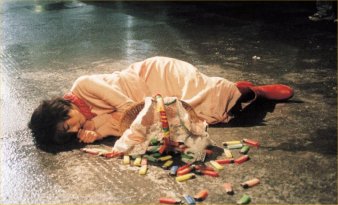 This was supposed to be Jang Sun-woo's first audience-friendly venture, an action film to make viewers forget the controversy of his past works (Lies (2000), Timeless, Bottomless, Bad Movie (1997), A Petal (1996), To You From Me (1994), etc). Although Jang may have fallen foul of both an anti-blockbuster bias and mainstream audiences' hostility towards obtuse narratives, Match Girl is nonetheless a completely original find, unlike anything else in the history of Korean cinema. It's in some ways fitting that it has crashed on so grand a scale; a lesser film would have just chalked up its loss and faded from memory.
This was supposed to be Jang Sun-woo's first audience-friendly venture, an action film to make viewers forget the controversy of his past works (Lies (2000), Timeless, Bottomless, Bad Movie (1997), A Petal (1996), To You From Me (1994), etc). Although Jang may have fallen foul of both an anti-blockbuster bias and mainstream audiences' hostility towards obtuse narratives, Match Girl is nonetheless a completely original find, unlike anything else in the history of Korean cinema. It's in some ways fitting that it has crashed on so grand a scale; a lesser film would have just chalked up its loss and faded from memory.
Match Girl starts with a retelling of Hans Christian Andersen's fairy tale "The Little Match-seller," which forms the basis of the film's narrative (click here to read the story). To explain how the plot develops from here is a challenge, but as viewers we move between what we assume to be the real world, where a reticent loser named Ju delivers Chinese food and hangs out at the video arcade to be close to the girl he likes, and the inner world of a video game based on Andersen's tale. Inside the game, which appears to be just as "real" as the world outside, Ju's mission is to prevent a modern version of the match girl from selling lighters on the streets of Busan. If she perceives him as her savior at the moment she freezes to death, then he wins the game.
Just like events in the real world, however, the game starts taking complicated turns. Ju falls in love with the match girl, and teams up with a transsexual warrior named Lala who possesses other-worldly fighting skills. Other players rush to co-opt the match girl, using sophisticated weaponry provided by a man selling fish cakes. The match girl starts sniffing gas from the lighters and then rebels against The System that created her. Ju begins pondering the principles of Taoism, through which he acquires a plastic gun which can blow car-sized holes in the sides of buildings.
In the screening I attended the couple sitting behind me walked out long before the end. To say that the plot is complicated is vast understatement -- it's a bewildering tangle. Nonetheless, the film has a poetic madness to it, together with a bad-ass attitude and far more high-tech explosives than were really necessary. Watching it can be exhilerating if you let go of trying to understand every twist and turn, and just go with it. After all, life doesn't make sense most of the time either.
With luck, this film will someday find a cult following abroad who can appreciate its ill-advised excesses. Jang has proven before that he doesn't really click with mainstream Korean society, but perhaps that just speaks to his ability to create works that are beyond his time. (Darcy Paquet)
As Korean films become ever more expensive and elaborate to produce, there are also a growing number of independent films being shot on digital video for a fraction of the cost. Camel(s) was shot with a single camera and ten crew members over the course of 12 days. Edited by the director with PC Premiere, the film ultimately cost only 98 million won ($75,000) to produce, yet at overseas festivals and increasingly in Korea it has become one of the most talked-about art films of the year.
 Director Park Ki-yong's previous film Motel Cactus (1997) -- his debut work -- was set in a motel room where four couples came to talk, make love, argue, and struggle with their feelings. Whereas the film's plot was confined to the space of the hotel, its lush cinematography by renowned cinematographer Christopher Doyle dominated and at times overpowered the narrative. Camel(s) takes a different track in using a black and white digital image and a completely static camera, which focuses the viewer's attention on the characters and ultimately makes for a stronger film.
Director Park Ki-yong's previous film Motel Cactus (1997) -- his debut work -- was set in a motel room where four couples came to talk, make love, argue, and struggle with their feelings. Whereas the film's plot was confined to the space of the hotel, its lush cinematography by renowned cinematographer Christopher Doyle dominated and at times overpowered the narrative. Camel(s) takes a different track in using a black and white digital image and a completely static camera, which focuses the viewer's attention on the characters and ultimately makes for a stronger film.
As the film opens we see a middle aged man and woman meet in front of the airport and drive off on a trip to an island. On the way, the man asks the woman her name. After realizing they won't have time to make the ferry, the couple end up spending the evening in a port city and going to a motel.
Long silences run through the film, as we follow the couple driving in the car or withdrawing money from bank machines, with much of their conversation occurring at meals. In their nervous gestures and awkward dialogue we learn much about them, however. Much of this is thanks to the extraordinary acting of the two leads: Lee Dae-yeon, who has taken supporting roles in films such as JSA and YMCA Baseball Team, and theatre actress Park Myung-shin. Their acting is so natural and convincing that it's easy to forget we are watching a film.
Part of the movie's fascination is that there is very little exposition outside of the couple's conversations. To understand their backgrounds and why they agreed to meet, we have to listen very closely to what they say and slowly piece things together. The film requires patience from the viewer, but ironically just as we begin to feel intimate with the characters, we sense a distance growing between them. Ultimately Camel(s) is an honest portrayal of two middle-aged people who are searching for something hard to articulate... the kind of characters seldom found in Korean films. (Darcy Paquet)
For two weeks in mid-October, the wondrous Saving My Hubby had a brief run on screens in Korea before sinking into commercial obscurity. This has happened to lead actress Bae Doona before: her previous films Barking Dogs Never Bite and Take Care of My Cat both got the cold shoulder from audiences on their release, although they later won over fans on DVD and at overseas festivals. Saving My Hubby is probably too commercial to get a look from most festivals, but it remains a hidden gem among the films Korea produced in 2002.
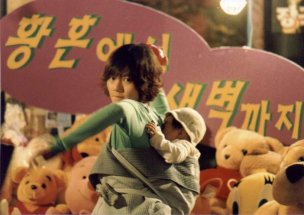 Written and directed by newcomer Hyun Nam-seop, the film tells the story of Geum-soon, a housewife in her early 20s who got married due to an unplanned pregnancy. A former volleyball star, Geun-soon struggles to adjust to married life together with her equally young and inexperienced husband (played by Kim Tae-woo, the younger South Korean soldier in JSA). Then late at night after her husband's first day of work, she receives a phone call from a bar owner who is keeping her husband hostage, claiming that he owes a $1400 drinking bill. Strapping her baby to her back, Geum-soon goes out to rescue her husband.
Written and directed by newcomer Hyun Nam-seop, the film tells the story of Geum-soon, a housewife in her early 20s who got married due to an unplanned pregnancy. A former volleyball star, Geun-soon struggles to adjust to married life together with her equally young and inexperienced husband (played by Kim Tae-woo, the younger South Korean soldier in JSA). Then late at night after her husband's first day of work, she receives a phone call from a bar owner who is keeping her husband hostage, claiming that he owes a $1400 drinking bill. Strapping her baby to her back, Geum-soon goes out to rescue her husband.
From the beginning, Saving My Hubby (literal title: "Be Brave, Geum-soon!") concentrates less on plot and more on character and the creepy neon underworld of Seoul's night life. Our young lead couple, who frequently resort to whiny hysterics, are clearly too young for the adult world they have been thrown into. Nonetheless when Geum-soon ventures out on her quest, she finds assistance from good-hearted souls amidst the squalor of the city streets.
The core of this film is without question Bae Doona's performance, which at first may seem a bit grating on the nerves, but nonetheless results in a completely different kind of heroine. The story is as much about her weaknesses as her strengths, and seeing her overcome these weaknesses provides an apt metaphor for how we cope with life's surprises.
The other thing that stands out in the memory after watching this film are the sheer number of crooks, freaks, and eccentrics roaming the streets and giving life to this modern day fable. Let's hope that this film's unrealized commercial ambitions do not prevent Mr. Hyun from going on to make a second movie. (Darcy Paquet)
Even though it is likely to ignite controversy among Korean filmgoers for its explicit depiction of gay sexuality, Road Movie is simply an excellent film, with or without sex scenes: a taut and poignant drama capable of holding its own against its cinematic predecessors such as Wim Wenders' Paris Texas and Gus Van Sant's My Own Private Idaho. To be sure, in Road Movie, same-sex love between men is not used as a narrative device to enhance melodramatics, as it is in, say, Bungee Jumping of Their Own: the characters approach this issue with refreshing candidness and pragmatism, and the movie braves the uncharted waters of the human heart where the currents of friendship, compassion, love and sexual desire co-mingle and merge into one another.
 Hwang Jeong-min (Waikiki Brothers) stars as Dae-sik, an erstwhile mountain climber who is now an unofficial den father of a group of homeless people living in the corridors of Seoul Station. He unwittingly saves the life of a ruined stockbroker Seog-won (Jeong Chan), taking the latter under his wing. Initially full of self-hate and upper-middle class snobbishness, Seog-won eventually forms a grudging friendship with Dae-sik and they set out on a road trip toward Dae-sik's hometown. Later, they pick up a pretty but no-nonsense prostitute Il-joo (Seo Lynn), who falls in love with Dae-sik. As their improbable menage a trois spirals into dissolution, we learn more about Dae-sik's life as a gay man forced to hide his feelings in an uncomprehending society.
Hwang Jeong-min (Waikiki Brothers) stars as Dae-sik, an erstwhile mountain climber who is now an unofficial den father of a group of homeless people living in the corridors of Seoul Station. He unwittingly saves the life of a ruined stockbroker Seog-won (Jeong Chan), taking the latter under his wing. Initially full of self-hate and upper-middle class snobbishness, Seog-won eventually forms a grudging friendship with Dae-sik and they set out on a road trip toward Dae-sik's hometown. Later, they pick up a pretty but no-nonsense prostitute Il-joo (Seo Lynn), who falls in love with Dae-sik. As their improbable menage a trois spirals into dissolution, we learn more about Dae-sik's life as a gay man forced to hide his feelings in an uncomprehending society.
Director Kim In-sik, who debuts with Road Movie but has worked in the Korean film industry since early 1990s, is in full control of the movie's tone and narrative. The sequence where Dae-sik, frantically rushing the catatonic Seog-won to a hospital in a shopping cart, is attacked by a pair of bikers armed with Molotov cocktails is as intense as anything I have seen in any Korean action film this year. The portrayal of the homeless is stark and resolutely unsentimental, unflinchingly showing us how not only camaraderie but also indifference to other people's misery are sometimes necessary for survival. The filmmakers also rein in the impulse toward weepy histrionics. When Dae-sik meets his estranged family it is all the more heartbreaking because tear-jerking cliches are avoided.
Moreover, this is one Korean movie that truly lives up to its title: it is a genuine road movie. The characters drive, walk, ride and drive some more, and the shifting landscape, mostly the mountains of the Eastern seaboard, is given the status of a character in itself: an eerily white rock quarry that suggests the ruins of an alien civilization: geometrical go-board patches of saltern, inscrutable under the sinking sun: and later, a shack filled with mounds of just-harvested salt, where the two main characters finally reconcile their differences with heartbreaking gestures of intimacy.
For me, the heart of Road Movie is perhaps best expressed in a rather small scene that occurs mid-point. Il-joo challenges Dae-sik, who is about to leave her: instead of slapping, berating or smooth-talking her, or responding with a baleful gaze and 'cool' silence, Dae-sik softly intones, "I am so sorry," and gives her a gentle hug, stroking her hair with his big, callused hands. We suspect that a Korean man is indeed capable of such gentleness and affection toward a woman (or man, for that matter) who is not an object of sexual desire or related by blood: it is just that we seldom encounter such a character amongst the endlessly churned-out gangster 'comedies' and arthouse hits suffering from madonna-and-whore dichotomitis. Sometimes we need an honest and thoughtful film like Road Movie to be reminded of such simple truths. (Kyu Hyun Kim)
One of the shorts by Noh Dong-seok that preceded his feature film debut My Generation, was a little black and white number named "Doggy." In this short, we followed a child trying to get the word out about his lost dog. What was interesting about this short for me was how the child slowly, metaphorically metamorphosizes into a dog himself. Although the dog still remains lost at the end of the film, it is clear his dog still remains very much inside of him.
 Something similar is going on in Kim Ji-hyun's independent film Popee. Rather than a dog running loose, a dog named "Popee" (after a popular tissue brand) is lost to natural causes. One might get confused, as I did until Darcy informed me, thinking that this film is a documentary. But Kim claims that it is not. So we cannot assume that we are witnessing Kim's story. This is just a story about a director, played by famous singer/songwriter Paek Hyun-jin (who also made an appearance in Flower Island as the lead singer of a ska band), who, as a means of grieving the loss of his dog Popee, decides to make a film about his relationship to Popee along with that of other dog/person relationships. (Acording to Kim, some of these other stories are "real" incidents.) All the dogs, found and lost, still live on within each of their human companions.
Something similar is going on in Kim Ji-hyun's independent film Popee. Rather than a dog running loose, a dog named "Popee" (after a popular tissue brand) is lost to natural causes. One might get confused, as I did until Darcy informed me, thinking that this film is a documentary. But Kim claims that it is not. So we cannot assume that we are witnessing Kim's story. This is just a story about a director, played by famous singer/songwriter Paek Hyun-jin (who also made an appearance in Flower Island as the lead singer of a ska band), who, as a means of grieving the loss of his dog Popee, decides to make a film about his relationship to Popee along with that of other dog/person relationships. (Acording to Kim, some of these other stories are "real" incidents.) All the dogs, found and lost, still live on within each of their human companions.
The telling of the stories relating to each dog are structured with each dog running through the paces of their owner's stories about them, such as the tale of a dog who found its way back to its owner over a long distance, the narrator wondering if the dog took the bus. That particular moment is nicely edited to coincide with the narration. We learn more than we may have wanted to know about the accepted views on spading and neutering dogs in South Korea. (Although no need to worry about anything nearly as disturbing and bizarre as Ulrich Seidl's Animal Love here.) This film presents a resistance to the practices. Most characters consider spading and neutering the unkindest of cuts.
Peculiarly of interest to me, the most pathetic of hagglers whom stall proprietors the world over could easily have over-paying for their wares, are the culturally specific moments detailing haggling techniques during commercial transactions. Efforts are made to nudge a doctor and a pet store owner towards making exceptions for two unique customers. In one case, when practiced by a veteran haggler, her tactics work. The veterinarian looks at Popee again, but, sadly, the diagnosis remains the same. In the other situation, it is actress Oh Yoon-hong (The Power of Kangwon Province, Green Chair) trying to get compensation for her dog's hospital bills from the person who sold her the dog a week before. Her efforts, however, fail. One haggling technique that is consistent across these two individuals concerns references to how the large size of something (like a veterinarian's sign and a hospital itself) stands in for quality and importance. Such a faulty association between big and better happens throughout the world. (As Cornel West mentions in Democracy Matters, the philosopher William James ". . . disparaged America's conflation of gigantism with greatness, . . .") But I find it compelling how here such an association is used so explicitly for the advantage of the patron as opposed to the proprietor.
Popee isn't a great film, but nor is it a lousy one. Still, I can see how some might find it boring and pointless. It doesn't leave me with any major revelations, just interesting moments that are enough for me to feel as if I wasn't wasting my time. When Shiki thanks the humans present at his birthday party, I couldn't help but Awww my way through the adorable scene. Rather than the usual cartoonish approach showing how dogs and their human companions look like each other, we discover how dogs are often defined by their owners and the interactions that support or subvert these imposed definitions. Our pets can be the most fruitful transference objects for our interpretations of our lives. But perhaps the greatest importance of this piece is putting to bed that damn racist stereotype of Koreans eating dogs that Jay Leno and other comics insist on bringing up again and again in their monologues whenever either Korea is in the news. This national mis-labeling is completely absent from this film, as it should be since it's been mis-applied too widely for too long, too often distracting us from the other Korean stories great and small. (Adam Hartzell)
In 2002, Korean cinema embraced two new genres - reproductions of the 1980s, like Bet on My Disco, and the sex comedy. American Pie style movies are not new to other Asian cinemas, but they had not appeared in Korea until the release of Wet Dreams The film was well-marketed and released on the day Korea's university entrance examinations ended, and ultimately it ended up as one of the top five domestic films of the year.
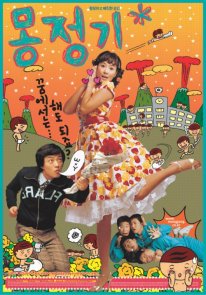 Set in the days of the late 1980s at a boys' middle school, the story opens with the appearance of a new apprentice female teacher Yoo-ri (Kim Seon-ah), a university student receiving practical teaching experience. Her appearance initiates the dreams of the students in her class. Four of the students cannot suppress thinking of sex in front of their new teacher, especially Dong-hyun (Noh Hyung-wook), who always dreams of love. However, their teacher's heart has gone to their homeroom teacher Byung-chul (Lee Beom-soo), who rejects love in his life.
Set in the days of the late 1980s at a boys' middle school, the story opens with the appearance of a new apprentice female teacher Yoo-ri (Kim Seon-ah), a university student receiving practical teaching experience. Her appearance initiates the dreams of the students in her class. Four of the students cannot suppress thinking of sex in front of their new teacher, especially Dong-hyun (Noh Hyung-wook), who always dreams of love. However, their teacher's heart has gone to their homeroom teacher Byung-chul (Lee Beom-soo), who rejects love in his life.
Wet Dreams is the second film of new director Jung Cho-shin after his debut, crazy robbery film Jakarta (2000). He showed unexpected experience in handling this new genre. Park Che-woon's cinematography presents the desire and hope of the secondary school boys for sexual experience. The sex jokes and tricks in the film are presented not in a dirty or erotic way, but as fun. Despite its genre as a sex film, actual sex appears only minimally, suiting the rhythm of the film. More than a sex comedy, Wet Dreams provides a down-to-earth perspective on puppy love.
This film also presents a pair of actors who are in their first-ever leading roles - Lee Beom-soo and Kim Seon-ah. Kim Seon-ah, who offered nothing more than an acting-disabled face in her debut Yesterday, was given a much more approachable role in Wet Dreams. She proved her acting abilities by expressing the fervour of a new teacher. Lee Beom-soo, who has been in show business for over 12 years, takes a solo-leading role in this film after co-starring in Jungle Juice. He makes a strong impression as an experienced man who is naive in love. However, the most noticeable cast member goes to Noh Kyung-wook, portraying the student who dreams of dating his new teacher all the time. He presents the emotion of the role in a realistic way.
The success of Wet Dreams represents the rewards reaped by Korean cinema for its creativity in trying different genres and good casting, rather than signaling the coming of plenty of sex comedies. This should encourage film companies for their further trials. (Ryan Law)
Mi-heun (Kim Yoon-jin - Shiri and the American TV show Lost) believes she has the perfect life but quickly discovers what was hidden underneath. On a day that underscores family exclusivity, Christmas, a young woman enters her home and disrupts the lies that maintained the stasis, exposing her husband's infidelity. (And resonating with the confusion that opens Park Chan-ok's Jealousy Is My Middle Name, this young woman exposes how the Tae-geuk-gi, the South Korean national flag, is mis-displayed, representing how Mi-heun's idyllic life is about to be thrown upside-down.) In an effort to recover from this travesty -- physically along with spiritually since Mi-heun suffered a nasty hit to the head from the young woman -- and an offering by her husband (Son Byong-ho - Spider Forest, R-Point) to pay penance for his transgression, the family leaves Seoul for a distant town. There, Mi-heun finds herself intrigued by the local doctor, In-gyu (Lee Jong-won - Nabi), an intrigue he reciprocates. In-gyu asks if she wishes to play a game. They are to start a sexual relationship for a few months, ending earlier when one of them says "Uncle", in this case, when one says to the other, "Sa-rang-hae!" ("I love you!"). The tension is thus cast to carry us through the rest of the film.
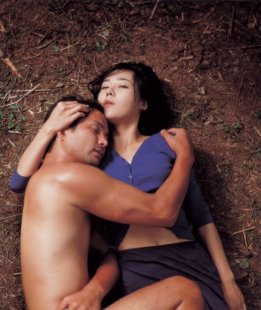 As a director known for her compelling triptych expose on Korean women forced into sexual slavery for soldiers serving under the Japanese Empire, some might consider Byun Young-joo's debut film Ardor, a film about the positive and negative lessons learned from sexual liaisons, quite ironic, or even contradictory. But any irony or contradiction is removed when we clarify how her acclaimed documentaries The Murmuring, Habitual Sadness, and My Own Breathing were not about sexual relations at all, but about power relations and acts of violence. Such is why I'm always hesitant to use the standard nomenclature for the women featured in Byun's documentaries, "Comfort Women." Such terminology is troubling since such softens what actually was taking place. The two main characters in Ardor have lots of hot, sweaty, invigorating, consensual (key word!) sex; the real-life women in Byun's trio of documentaries have acts of violence committed upon them. This is a huge difference that cannot be overstated.
As a director known for her compelling triptych expose on Korean women forced into sexual slavery for soldiers serving under the Japanese Empire, some might consider Byun Young-joo's debut film Ardor, a film about the positive and negative lessons learned from sexual liaisons, quite ironic, or even contradictory. But any irony or contradiction is removed when we clarify how her acclaimed documentaries The Murmuring, Habitual Sadness, and My Own Breathing were not about sexual relations at all, but about power relations and acts of violence. Such is why I'm always hesitant to use the standard nomenclature for the women featured in Byun's documentaries, "Comfort Women." Such terminology is troubling since such softens what actually was taking place. The two main characters in Ardor have lots of hot, sweaty, invigorating, consensual (key word!) sex; the real-life women in Byun's trio of documentaries have acts of violence committed upon them. This is a huge difference that cannot be overstated.
Now, infidelity in its technical definition can often hurt others. Yet, this film presents the nuances of real life within a fantasy rather than the simple round-hole dictums into which our so-called moral leaders often wish to pound some of our square-pegged selves. In-gyu, as presented in the story, is not actually engaging in infidelity per se, since his wife knows he is someone that cannot stay sexually tied to only one person, asking only that he never expose her to his trysts. On Mi-heun's side we have an act of revenge hidden as infidelity, a passive-aggressive act emanating from the hurt her husband's infidelity caused her. This stems from Mi-heun's initial dishonesty with herself, thinking she could forgive her husband for what he did, but her actions confess otherwise. And it is also a moment of awakening for her. Many of us have been opened to our sexual selves when we discover those people whose bodies simply seem to fit better than others. The scenario in Ardor is complicated by multiple desires, desire for revenge, desire for a return to the idyllic, desire for full sexual expression, desire for our imperfect selves to be the perfect mother/father for our child, all desires that make life the interesting morality play that keeps things entertaining, when not anxiously foreboding.
Still, Byun can not keep from bringing reality into this fantasy. She establishes a friendship between Mi-heun and a store owner (Kim Min-chae), the latter who is abused by her husband. Such is a beginning of what will be a Byun tactic in her fiction, having privileged characters learn from marginalized peoples.
Ardor provides enough of an engaging story for me to recommend it, at least for those who don't have problems watching people get freaky. The first sex scene between our gamers is worth it alone. Later, Mi-heun's schoolgirl anticipation of a later tryst, sneaking out of her home in only her bland nightgown, is equally sexy in that exuberant way anxious consummation provides. Byun brings an interesting direction to many scenes that had me wondering if male directors would ever make similar choices. When Mi-heun's solitary, naked body approaches a window in a later scene, it is done from what seems to be a purposely respectful distance, prohibiting the viewer from being a simple voyeur, while still allowing for the intimacy the scene intends. And the dialogue poses a different perspective as well. Rather than presenting the 'penetration' descriptors so often used to describe certain sex acts, Byun works off the ecstasy-inducing enveloping of the Keegle muscles. (And let's just note the ridiculousness, if not injustice, of female muscles being named after the male doctor who "discovered" them.) The subtitles describe sex as pulling in, sucking in, and squeezing. Such ways of descibing sex as envelopment explain well how wonderful it is to have your body received by another body or to be the one drawing that body in. This joy is why many of us are so willing to engage in it, (just like the extreme sport athletes Mi-heun wonders about), even when circumstances pose great danger to our emotional, physical, and social well-being.
Kim Yoon-jin's transitioning of Mi-heun from lifeless, wifely despondency to playful, young adult exuberance as she discovers herself within the danger she chooses contributes to the success of this film. It is testament to Kim's acting, Byun's direction, Kwon Hyeok-jun's cinematography, and Yang Yeon-yeong's make-up that Mi-heun comes across equally tempered in her initial unattractiveness and her eventual attractiveness, rather than overdoing either end.
However, the film has its faults. Particularly in the set up of the husband's affair and the beginning of Mi-heun and In-gyu's game. Both are brought into the narrative quite abruptly, to the point of appearing forced so that we might rush to the weightier parts of the picture. Yet, regardless of the missteps when introducing these necessary aspects of the plot, Byun further demonstrates she can tackle difficult, complex, controversial topics with considerable aplomb. (Adam Hartzell)
The team of director Kim Sang-jin and screenwriter Park Jeong-woo make up one of the most successful collaborations in Korean cinema. Beginning with the hit comedy Attack the Gas Station (1999) and continuing on through Kick the Moon (2001), the two have become an undeniable force at the box-office. Their latest hit Jail Breakers continues on in the same vein as the previous films, with a clever story and a strong cast of Sol Kyung-gu (Oasis), Cha Seung-won (Kick the Moon) and Song Yoon-ah (A Masterpiece in My Life).
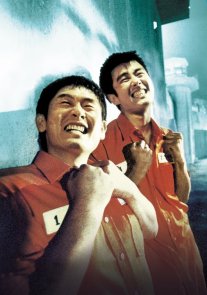 The movie's story, which was later purchased for remake rights by Hollywood studio Warner Brothers, follows two prisoners who were jailed for relatively minor crimes, but who are now desperate to make it out of prison (for different reasons). Through great effort, they succeed in breaking out of prison (viewers will notice the obvious references to The Shawshank Redemption). Elated, they steal a car and drive to Seoul, only to open up the newspaper and discover something that makes them wish they had never broken out in the first place...
The movie's story, which was later purchased for remake rights by Hollywood studio Warner Brothers, follows two prisoners who were jailed for relatively minor crimes, but who are now desperate to make it out of prison (for different reasons). Through great effort, they succeed in breaking out of prison (viewers will notice the obvious references to The Shawshank Redemption). Elated, they steal a car and drive to Seoul, only to open up the newspaper and discover something that makes them wish they had never broken out in the first place...
Like the two movies which preceded it, Jail Breakers starts out with a simple premise and a large group of outlandish characters. As the story progresses, the director gradually pushes up the volume and overall level of chaos until by its climax, everyone is raging out of control. Only through a last, impassioned effort for negotiation is the situation able to find a resolution.
Whether or not you like this film likely depends upon your attitude towards this style of humor (people who liked Kick the Moon are sure to enjoy this as well; if you didn't, you're probably better off skipping it). The opening in particular is well-executed and clever, quickly laying the groundwork for the story to follow.
The movie does feel somewhat long, however -- by the time the climax comes around, some viewers may feel a bit weary of all the shouting and brawling. Some may fault the final resolution of the film as well for feeling somewhat forced and unnatural. Nonetheless this particular brand of Korean humor is something you're unlikely to find anywhere else, and fans of Kim Sang-jin are sure to appreciate his latest romp. (Darcy Paquet)
The heartthrob Jang Dong-gun made headlines for choosing the controversial director Kim Ki-duk's (The Isle, Address Unknown, Bad Guy) newest film for his next project. The Coast Guard generated considerable anticipation, culminating in it being chosen as the opening picture for the 2002 Pusan International Film Festival. Once unveiled, however, the film was met with critical responses ranging from faint praise to outright hostility and more or less ignored by the public. By no means a worthless film, The Coast Guard is one of the more interesting and instructive misfires of 2002, in a sense paralleling Resurrection of the Little Match Girl's disastrous failure to reach out to its supposed constituency.
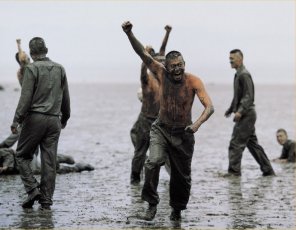 Jang plays an army coast guard, identified only as Private Kang, stationed in a remote east coast region. He appears to be obsessed with the idea of killing a North Korean spy and collecting the reward. When Kang sees moving shadows on his watch, (actually a local couple making love) he riddles them with machine gun fire, killing the man. The woman, Mi-yung, (Park Ji-ah) is driven insane by the shock, haunting the beaches, waddling into the surf, etc. Private Kang receives a citation for conducting his duties without fail, despite the protests from local population. However, it is only a matter of time before the guilt and anger borne by Kang begins to create a whirlpool of insanity and violence around him.
Jang plays an army coast guard, identified only as Private Kang, stationed in a remote east coast region. He appears to be obsessed with the idea of killing a North Korean spy and collecting the reward. When Kang sees moving shadows on his watch, (actually a local couple making love) he riddles them with machine gun fire, killing the man. The woman, Mi-yung, (Park Ji-ah) is driven insane by the shock, haunting the beaches, waddling into the surf, etc. Private Kang receives a citation for conducting his duties without fail, despite the protests from local population. However, it is only a matter of time before the guilt and anger borne by Kang begins to create a whirlpool of insanity and violence around him.
The Coast Guard features the elements we expect from its troubled but talented auteur: excessive and wholly repulsive violence, emotionally scarred characters, gritty but curiously beautiful mis en scene, and, of course, women subject to hideous mental and physical abuse. Women in Kim's cinematic world are degraded as objects of sexual violence (Suffice to say that in many of Kim Ki-duk's films, the "regular" form of sexual intercourse is rape) on the one hand, and touted, almost worshipped, as the sacred creatures who can cure these poor men of their mental traumas, by their acts of sacrifice and motherly embrace, on the other. This extremist view on women has quite understandably led many feminist critics to consider his films an equivalent of a slap in the face. I tend to sympathize with the feminists on this issue, although Kim's obsessive tormenting of women in his films often strike me not so much offensive as juvenile and inane. The Coast Guard inevitably defines Mi-yung's insanity by making her a nymphomaniac and a sexual slave of the coast guard troops. The nadir is reached when the troop members kidnap the pregnant Mi-yung and perform an impromptu abortion on her: blood flows like a river from her crotch, she becomes even more incurably insane, and to illustrate this Kim has her submerge herself in a fishtank at a seafood restaurant and bite off the head of a fish. Did Kim Ki-duk really think this type of combination of ludicrous art-cinema gestures and wretchedly pornographic excess could possibly have any appeal to film critics, much less ordinary viewers?
Jang Dong-gun does not fare much better. Bug-eyed and jerking like a marionette with cut strings throughout the movie, he will prove a disappointment to many of his fans, although most of the fault lies with the acutely unimaginative screenplay. Since Private Kang is so obviously unbalanced from the get-go, Jang is hardly given any opportunity to bring depth to his role. There is no room for developing a character or conveying inner struggles through acting here: Kang is a complete cipher, a human slogan that may as well wear a headband that reads "The Tragedy of a Divided Nation."
The Coast Guard deserves some recognition for striving to connect the sexual pathologies and unrelenting psychological obsessions of his characters to the ideological strait-jacket that the Korean peninsula is confined in. In all fairness, had it been released in mid-'90s, along with films like Sesang Bakuro/Out to the World (1994) and A Petal (1996), it might have been welcomed as an expression of daring political and artistic vision. Seeing it in post-JSA 2002, however, the film's cumulative effect on this viewer was mainly frustration and irritation, as if you are trying to appreciate a beautiful and moving poem, "performed" in gurgles and shouts by a drunkard who had had too much soju. Personally speaking, I would like to see Kim Ki-duk return to the cinema of primitivist visual poetry a la The Isle. Why make a heavy-handed and corny political allegory when he can stake a claim as a truly original filmmaker in other directions? Despite the disappointment of The Coast Guard, I do look forward to Kim's next film: I just hope against hope that he would write in at least one "normal" female character in it. (Kyu Hyun Kim)
What makes a Korean film a "Korean" film? Although some would say that the film must simply feature Koreans, the Korean language, and/or South Korea, films such as Kazoku Cinema, Asako In Ruby Shoes, and Iron Palm bring doubts to such criteria. Most of Iron Palm takes place in Los Angeles, half of Asako In Ruby Shoes takes place in Japan and in Japanese, while none of Kazoku Cinema takes place in South Korea or Korean and the questioning of national identity is part of the film's theme.
 Those of us who had yet to really think about what constituted a "Korean" film were probably surprised when Hong Kong director Fruit Chan's Public Toilet was included in a series on South Korean Cinema at the Toronto International Film Festival in 2003. Although a significant storyline takes place in Pusan, South Korea, featuring actors Jang Hyuk (Volcano High, Please Teach Me English), Jo In-sung (The Classic), and Kim Yang-hee, rather than prove it's Korean-ness, the trajectories of the film's characters show how difficult any-ness is to pin down. Our main character, the Chinese Dong-Dong, travels from Beijing to Pusan in search of Korean ginseng to heal his sick grandmother. Later, in New York, while speaking Mandarin to his Italian friend who had left his Beijing birthplace to learn his Italian history, Dong-Dong meets a professional killer who is an American immigrant from Hong Kong whose girlfriend recently went to The Great Wall in search of a cure for her mother's ailment. At the same time, Dong-Dong's friend Tony, is traveling to India in search of "Holy Ashes" for his sick brother Sheng who watches Bollywood musicals while in hospital. On route, Tony is called out as a "rare" Japanese blonde by a Cantonese-speaking, Hong Kong born Indian on his first trip to India, along with his similarly lingual-ed and birthed brother who himself is a "rare" Indian blonde.. Layer upon layer of identity confusion emerges, Somali's kicking Mandarin in China, Chinese speaking Korean to Koreans in China. Each new layer seriously bringing into question all that nationalism we hold so dear. And add to the layer of nationality confusion the fact that Chinese Dong-Dong is played by a Japanese actor, Abe Tsuyoshi. (There may be more confusion, since Chan's commentary on the DVD extras appears to present that he meant Tony to be Japanese. Tony is played by Chinese Zhe Ma, but it is unclear from the translated dialogue if Tony really is Japanese - his little brother's name is the un-Japanese, very Chinese, "Sheng" - or merely mistaken as such by the Indians, as is often the experience for any Asians traveling outside East Asia.)
Those of us who had yet to really think about what constituted a "Korean" film were probably surprised when Hong Kong director Fruit Chan's Public Toilet was included in a series on South Korean Cinema at the Toronto International Film Festival in 2003. Although a significant storyline takes place in Pusan, South Korea, featuring actors Jang Hyuk (Volcano High, Please Teach Me English), Jo In-sung (The Classic), and Kim Yang-hee, rather than prove it's Korean-ness, the trajectories of the film's characters show how difficult any-ness is to pin down. Our main character, the Chinese Dong-Dong, travels from Beijing to Pusan in search of Korean ginseng to heal his sick grandmother. Later, in New York, while speaking Mandarin to his Italian friend who had left his Beijing birthplace to learn his Italian history, Dong-Dong meets a professional killer who is an American immigrant from Hong Kong whose girlfriend recently went to The Great Wall in search of a cure for her mother's ailment. At the same time, Dong-Dong's friend Tony, is traveling to India in search of "Holy Ashes" for his sick brother Sheng who watches Bollywood musicals while in hospital. On route, Tony is called out as a "rare" Japanese blonde by a Cantonese-speaking, Hong Kong born Indian on his first trip to India, along with his similarly lingual-ed and birthed brother who himself is a "rare" Indian blonde.. Layer upon layer of identity confusion emerges, Somali's kicking Mandarin in China, Chinese speaking Korean to Koreans in China. Each new layer seriously bringing into question all that nationalism we hold so dear. And add to the layer of nationality confusion the fact that Chinese Dong-Dong is played by a Japanese actor, Abe Tsuyoshi. (There may be more confusion, since Chan's commentary on the DVD extras appears to present that he meant Tony to be Japanese. Tony is played by Chinese Zhe Ma, but it is unclear from the translated dialogue if Tony really is Japanese - his little brother's name is the un-Japanese, very Chinese, "Sheng" - or merely mistaken as such by the Indians, as is often the experience for any Asians traveling outside East Asia.)
Dong-Dong sees his multicultural crew as exactly like him in their use of chopsticks and other mannerisms. This mish-mash of identities may represent a floating non-identity, such as when one of the HK-born Indians says, "In Hong Kong we're aliens; in India we're foreigners." But it also presents the AND-ing of identity. When Dong-Dong meets a Chinese-Korean practitioner of Chinese medicine in Pusan, the doctor aligns with Dong-Dong by noting they are both Chinese. But seconds later when the doctor discredits Dong-Dong's desire for Korean ginseng, the doctor defends his view by saying "I AM a Korean." It's as if he's eschewing the hyphen I just gave him, claiming both identities as equally valid, similar to the recent use of the Japanese identifier daboru (double) rather than hafu (half) for those of mixed heritage emphasizing the whole over the fragments of hybridity.
Personally, regardless of the poor acting and weak sound that pops up quite often in the film and the rap song that is unintentionally laughable, I feel Public Toilet is a film of merit and warrants special mention, similar to the folks in the Hong Kong Film Critics Society and at the Venice Film Festival respectively who awarded this film as such. Like the mysterious Ocean Girl in Pusan, I eat this kinda shit up. And I use that colorful scatological word purposely here since the film is covered in it. Dong-Dong's nickname is "The God of Toilets" since his grandmother adopted him after finding him abandoned in the sewage beneath the squat-holes of a public toilet. This comfortable approach with what is normally kept outside of polite conversation and view may cause disgust in some viewers. (I highly recommend not eating while watching this film.) But the casual depiction of human excrement is meant to follow the flow of refuse from country to country, connecting our characters who each seek cures from modern ailments through their fantasies about the healing powers within other countries.
And perhaps it is here in the subject matter of human waste that the Koreanness of Public Toilet can be found. Every friend of mine I introduce to Korean Cinema eventually comments on the volumes of bodily fluids sprayed across the screen. As I wrote in my review of Bizarre Love Triangle -- It ain't a modern Korean film without it. But maybe an even more appropriate reason for the legitimizing of a Korean moniker can be found in the words of little Sheng's elderly hospital roommate, Fatty. "The Korean film you recommended last time was a gem. Great special effects. They got me so excited, I had to take another dump!" That infomercial hidden as testimonial further hidden as dialogue announces which country clearly owns this shit. (Adam Hartzell)
The filmic career of this independent digital feature about an elderly couple in love has followed an unusual arc. It began at the pinnacle of respectability, being selected to screen in the Critics' Week section at the 2002 Cannes International Film Festival. After receiving a number of very positive reviews, it went on to be selected for the Toronto International Film Festival's showcase of Korean cinema, and then received a special grant from the government-supported Korean Film Commission to help finance the film's transfer to 35mm film for a release in Korea. Then, alas, the film was submitted to the nation's Media Ratings Board, where it was judged unfit for public viewing and banned from release in ordinary theaters.
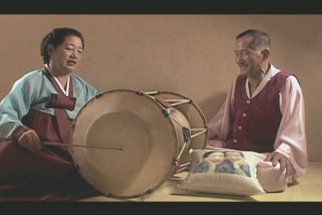 Too Young To Die is based on the true story of Park Chi-gyu and Lee Soon-ye, a man and woman in their early seventies who met, fell in love, and then rediscovered sex. The couple, who play themselves in the movie, seem little different from a couple in their twenties. They tease each other, fret about their hair, take snapshots of themselves, argue over trifles, and leap into bed with unabashed frequency. Indeed, watching them forces you to rethink all your stereotypes of what it is to be old.
Too Young To Die is based on the true story of Park Chi-gyu and Lee Soon-ye, a man and woman in their early seventies who met, fell in love, and then rediscovered sex. The couple, who play themselves in the movie, seem little different from a couple in their twenties. They tease each other, fret about their hair, take snapshots of themselves, argue over trifles, and leap into bed with unabashed frequency. Indeed, watching them forces you to rethink all your stereotypes of what it is to be old.
First-time director Park Jin-pyo has filmed this work with great skill, humor, and tact. If his film seems shocking, it is because it challenges the narrow attitudes that many people have towards the old. Many treat the elderly as if their feelings have grown dim, just as people might lose their hearing. Watching this film is like a shock of cold water. And yet surely no one, not even the people who banned it, could look at it and call it pornographic.
Government censorship of film was abolished in South Korea in 1995. In its place was put a board of civilians -- schoolteachers, lawyers, film directors, critics, businessmen -- appointed to choose ratings for films scheduled for release. Under the leadership of veteran film director Kim Su-yong, the board has taken on rather more responsibility than was provided for by law, deciding which films should be released, and which shouldn't. After a court decision ruled that their practice of denying ratings to films they didn't like was unconstitutional, they began giving a new rating -- "restricted" -- which obligates films to be screened in special adult theaters which currently do not exist.
Films which capture images and ideas that challenge our thinking and make us see the world anew are rare and valuable. A work like Too Young To Die is one of the most eloquent arguments that can be made for the influence cinema can have on people and society. It raises questions about the efficacy of the system when perhaps the most important Korean film made in 2002 is judged to be unfit for viewing by those in their twenties, thirties, or even in their seventies. (Darcy Paquet)
Note: The restrictions placed on this film were lifted in late October, when the film's production company agreed to darken the lighting on several scenes. No cuts were made, but many filmmakers expressed frustration that the ratings board had gotten its way once again. The film was released on December 6.
Bizarre Love Triangle triangulates a new order between Bae Eun-hui (Cho Eun-ji), a whiny princess and star wannabe, Oh Doo-chan (Choi Gwang-il), her successful comedian husband, and Hwang Keum-sook (Gong Hyo-jin), her old high school friend who is a Tae-Kwon-Do instructor. (The latter character's profession is why the film's alternative title, and how it needs to be search on IMDB.com, is Taekwon Girl.) The latter two points in this triangle are never really connected outside of a disturbing revenge scene. A comedy that flirts in and out of melodrama, (as so many Korean films do making said description redundant), Bizarre Love Triangle provides some humorous moments amongst unfunny moments. However, regardless of whether or not one might find anything to laugh at here, the film becomes an important one concerning a running theme in Contemporary Korean Cinema.
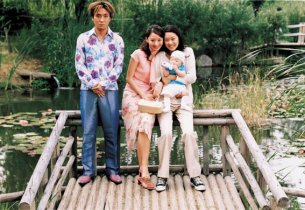 Intermittently narrated from the future somewhere in outer space, Bizarre Love Triangle follows Doo-chan who, at the height of his career, meets Eun-hui through a TV telethon to assist her in raising funds to help her sick child. They fall in love through this experience and Doo-chan then uses his connections to assist her in reaching her dream of similar success in television. Regardless of Doo-chan's help, Eun-hui fails to achieve TV stardom due to lack of any talent. Along the way down professionally, Eun-hui realizes her initial connection with Keum-sook was not just friendship, but love as well. This brings in what is portrayed as the 'bizarre' aspect of this three-party relationship, perpetrating the protocols of a marriage while Eun-hui maintains her secret love with Keum-sook. Although the preponderance of penis-shaped dildos bobble-heading throughout some scenes presents the Lesbian relationship within a heterosexual male lens, this is a comedy and such props definitely create the desired effect. Our three leads, for the most part, are interesting characters, although Eun-hui's character's histrionics make you wonder why anyone, male or female, would fall in love with this woman.
Intermittently narrated from the future somewhere in outer space, Bizarre Love Triangle follows Doo-chan who, at the height of his career, meets Eun-hui through a TV telethon to assist her in raising funds to help her sick child. They fall in love through this experience and Doo-chan then uses his connections to assist her in reaching her dream of similar success in television. Regardless of Doo-chan's help, Eun-hui fails to achieve TV stardom due to lack of any talent. Along the way down professionally, Eun-hui realizes her initial connection with Keum-sook was not just friendship, but love as well. This brings in what is portrayed as the 'bizarre' aspect of this three-party relationship, perpetrating the protocols of a marriage while Eun-hui maintains her secret love with Keum-sook. Although the preponderance of penis-shaped dildos bobble-heading throughout some scenes presents the Lesbian relationship within a heterosexual male lens, this is a comedy and such props definitely create the desired effect. Our three leads, for the most part, are interesting characters, although Eun-hui's character's histrionics make you wonder why anyone, male or female, would fall in love with this woman.
Rarely do I ever find myself inspired to write a review for a film unless there are spectacular scenes, intriguing storylines, or moments significant to Korean Cinema. And Bizarre Love Triangle has two out of three. The first is the intriguing circularity of the beginning joke. Comedy takes many forms, such as fun with word play, surreal displays of non-sequitors, cultural misplacement, methods in political attack (at those in power and at those over whom one has power), and surveys into the pathetic, the ridiculous and, well, the bizarre. The joke that begins the film works within the latter and returns to coda later bringing the joker to a new understanding while still retaining the humor.
But it is the second moment worth mentioning that makes the film worthy of inclusion in any exploration of the contemporary canon. As we know, it's not a modern day Korean film if at least one character doesn't vomit, urinate, bleed, or defecate. Fluids abound as much as any other trope in Korean Cinema and Bizarre Love Triangle certainly continues in this recent tradition. Although the removal of previously strict censorship barriers is one of many explanations for all these waste full explosions, director Lee Mu-yeong and screenwriter Jeong Hui-seong bring an alternative method to this madness. Review protocol keeps me from going any further. But I won't spoil it by telling you that, personally, I found myself reflecting on the Japanese author Oe Kenzaburo here. In his work, there is always that need to get deep down into the dark, dank, nastiness of life and ourselves to reach some epiphany. In this way, transcendence is not found in light, but in darkness. Bizarre Love Triangle demonstrates what might be floating around in the jetsam of Korean Cinema. That is, a willingness to get down and dirty because that may be where we are more likely to discover our honest selves. Such was enough for me to reconsider this film, as much as it may have meant muddling through the muck of some lesser moments to reach this understanding. (Adam Hartzell)
Considering that American Pie flopped in Korea, it must have taken at least a little bit of nerve to expect big returns out of a Korean sex comedy. Even more brash was to release it on the same day as the second Harry Potter film, but for Sex is Zero the risks have paid off enormously. The film sold almost as many tickets as Harry Potter, and earned more than $20 million in Korea alone.
 Subtle it is not, but Sex is Zero is an entertaining way to spend an evening, for those who can stomach the bodily fluids on display. The story focuses on Eun-shik (played by singer/actor Lim Chang-jung), who returns from his obligatory military service to enroll at the university. After joining the Power Man Club, he becomes acquainted with the women in the aerobics club who share the same gym. Though seldom on purpose, he finds himself entangled in numerous outrageous and embarrassing situations, all the while falling deeper in love with the most popular woman on the aerobics team (played by rising star Ha Ji-won).
Subtle it is not, but Sex is Zero is an entertaining way to spend an evening, for those who can stomach the bodily fluids on display. The story focuses on Eun-shik (played by singer/actor Lim Chang-jung), who returns from his obligatory military service to enroll at the university. After joining the Power Man Club, he becomes acquainted with the women in the aerobics club who share the same gym. Though seldom on purpose, he finds himself entangled in numerous outrageous and embarrassing situations, all the while falling deeper in love with the most popular woman on the aerobics team (played by rising star Ha Ji-won).
Writer and director Yoon Je-gyun says that most of the incidents in this film are based on his own and his friends' experiences at the university. I'm not sure whether to believe that, but the content of this film is quite strong, in sexual terms as well as its propensity to induce nausea (the gasps and groans at the screening I attended were rather loud). More than the jokes themselves, though, the film's biggest strength is the energy it maintains, thanks to enthusiastic acting and capable directing.
As with his highly successful debut feature My Boss, My Hero (which, coincidentally, was also released on the same day as a Harry Potter film), director Yoon shifts gear into a more serious mood towards the end of the film. Whether viewers find this twist daring or reactionary, it gives an added layer to the film which its posters and trailers don't hint at.
Societal attitudes towards sexuality is often one of the most noticeable differences between cultures, though also one of the most difficult to pinpoint. Much of this film's appeal likely rests in how its genre allowed the filmmakers to break the rules a bit with regard to how sex is presented in mainstream films. If American Pie flopped because of cultural differences, then perhaps Sex is Zero can give viewers some food for thought about how the rules are structured for Korean films. (Darcy Paquet)
A team of crime investigators headed by Kim Mi-yun (Yeom Jung-a) is summoned to a garbage dump, where a disgustingly mutilated body of a high school girl is discovered, along with a fetus removed from her body and deposited in a brown bag. Another pregnant woman is strangled to death in a bus, her belly cut open, spilling out a still-moving unborn child. They find that the modus operandi of these gruesome murders is an exact replica of the ones perpetrated in the past by the psychotic Shin Hyun (Jo Seung-woo), now a condemned inmate. The police naturally conclude that a copycat is carrying out these new murders. Detectives Kim and Kang (Chi Jin-hee), however, are convinced that Shin Hyun is somehow committing the murders without ever leaving his jail.
 Definitely not for the squeamish or easily offended, Lee Jong-hyuk's H is an urban horror-thriller in the mold of Tell Me Something (1999), but also draws upon various plot devices of the Hollywood genre prototypes, such as Se7en, Jennifer 8 and Silence of the Lambs. It boasts a well-mounted production with distinctive production design and cinematography. The latter, supervised by Peter Gray and Ham Seong-won, contributes a great deal to the film's uniquely and unremittingly dark atmosphere. H unfolds in a perpetually nocturnal urban purgatory, full of empty, wet corridors, crawling with unseen evil presences, casting their shadows on grimy walls. The minimalist music score and sound design work well: most impressively in the horrific "ear-slicing" sequence. I also like the relationship among the three cops, who are all believably professional and suitably humanized: Yeom Jung-a, who played a key supporting role in Tell Me Something, proves that she can carry a film on her shoulders. I approve the fact that her Mi-yun does not even give a furtive glance to the ruggedly handsome Kang. Chi Jin-hee does not overplay his hand as an outwardly tough cop carrying with him deep psychological scars. And Seong Ji-ru as Detective Lee provides an excellent supporting performance as a crude, loud but efficient cop.
Definitely not for the squeamish or easily offended, Lee Jong-hyuk's H is an urban horror-thriller in the mold of Tell Me Something (1999), but also draws upon various plot devices of the Hollywood genre prototypes, such as Se7en, Jennifer 8 and Silence of the Lambs. It boasts a well-mounted production with distinctive production design and cinematography. The latter, supervised by Peter Gray and Ham Seong-won, contributes a great deal to the film's uniquely and unremittingly dark atmosphere. H unfolds in a perpetually nocturnal urban purgatory, full of empty, wet corridors, crawling with unseen evil presences, casting their shadows on grimy walls. The minimalist music score and sound design work well: most impressively in the horrific "ear-slicing" sequence. I also like the relationship among the three cops, who are all believably professional and suitably humanized: Yeom Jung-a, who played a key supporting role in Tell Me Something, proves that she can carry a film on her shoulders. I approve the fact that her Mi-yun does not even give a furtive glance to the ruggedly handsome Kang. Chi Jin-hee does not overplay his hand as an outwardly tough cop carrying with him deep psychological scars. And Seong Ji-ru as Detective Lee provides an excellent supporting performance as a crude, loud but efficient cop.
Unfortunately, that bane of Korean thriller/mystery genre, the bad script, returns to defeat the best efforts of the production team. To begin with, Shin Hyun's character is utterly misconceived. You believe that Jeff Goldblum in Mr. Frost could instantly kill a grown man with a toenail clipper. You believe that Anthony Hopkins as Hannibal Lecter could casually talk a fellow inmate into swallowing his own tongue and thus choking himself to death. This is partly because Goldblum and Hopkins are talented actors, but more importantly because the script painstakingly establishes the frightening abilities of their characters through suggestion, inference and gradual unveiling of background information. Shin Hyun, in contrast, sneers like a smart-aleck college student who has read too much Nietzsche. When he should appear sharply intelligent, mysterious and even devilishly charming, he is merely annoying and pretentious. Moreover, there are sections in the movie where information is not clearly conveyed to the viewers: you never exactly find out, for instance, how Detective Kim hit upon the clues for the second murder inside the commuter bus. Finally, the climactic revelation is a complete letdown: H's solution to the problem of remote control murders is a bag of tea that has already been brewed many times in Japanese cinema, most notably in Kurosawa Kiyoshi's Cure (1997) and Inagaki Goro's Saimin (1999) [Original Japanese title: to reveal its English title would be a spoiler for H]
More effective than the post-Scream teen horror pics and another pregnancy-themed clunker Unborn But Forgotten, H nonetheless falls way short of the standard set by the superb Tell Me Something. (Kyu Hyun Kim)
The year 2002 featured an unusually high number of films set in the 1980s, from Bet On My Disco and Champion to Are You a True Guy? and the first episode from omnibus film No Comment. Taken together, we notice some striking similarities among the group. All of the movies feature lower class heroes, most of whom are struggling just to get by. For these heroes, their primary advantage in life are not money or connections, but their fists. Boxing stands in as a means of social advancement for the heroes of Champion and Are You a True Guy?, while the fighting skills of Hae-jeok in Bet On My Disco represent his primary advantage in life.
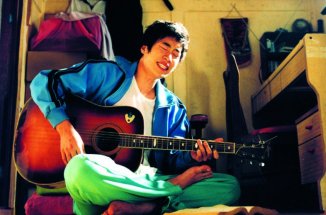 Conduct Zero, also set in the eighties, centers around Joong-pil, who is the undisputed "king" of his high school due to his legendary fists. Through intimidation and stealing other kids' money, he manages to do well for himself, until the day he falls in love with a bookish but audacious girl from the neighboring high school.
Conduct Zero, also set in the eighties, centers around Joong-pil, who is the undisputed "king" of his high school due to his legendary fists. Through intimidation and stealing other kids' money, he manages to do well for himself, until the day he falls in love with a bookish but audacious girl from the neighboring high school.
Based on a screenplay by Lee Hae-jun and Lee Hae-young (who, despite their similar names, are not brothers), Conduct Zero is one of the more creative and interesting comedies put out in recent years. First-time director Cho Geun-shik handles the story well, drawing strong performances from all of his actors and handling the quiet moments as well as he does the loud and outreageous ones. The film proved to be a hit at the box-office as well, despite a slow start and heavy competition from Lord of the Rings: The Two Towers.
Top marks for this film has to go to the actors, however. Real-life couple Ryu Seung-beom and Gong Hyo-jin are increasingly being recognized as the most talented among Korea's young generation actors. They have starred together in TV dramas, but this is the first time they have appeared in the same movie. Ryu gives such life to his role that it's hard to imagine how anyone else could have taken this part. Gong, as the boss of the neighboring girls' high school, is just as convincing with her tough talk and her dawning realization that Joong-pil is dropping out of her social circle. Im Eun-kyung (Resurrection of the Little Match Girl ), meanwhile, plays the part of the love interest with an effective mixure of fragility and courage.
Even though foreign viewers will miss some of the film's many references to Korean culture of the 1980s, Conduct Zero is one of the year's most satisfying films and another interesting glimpse of how Koreans in their thirties remember growing up. (Darcy Paquet)




































